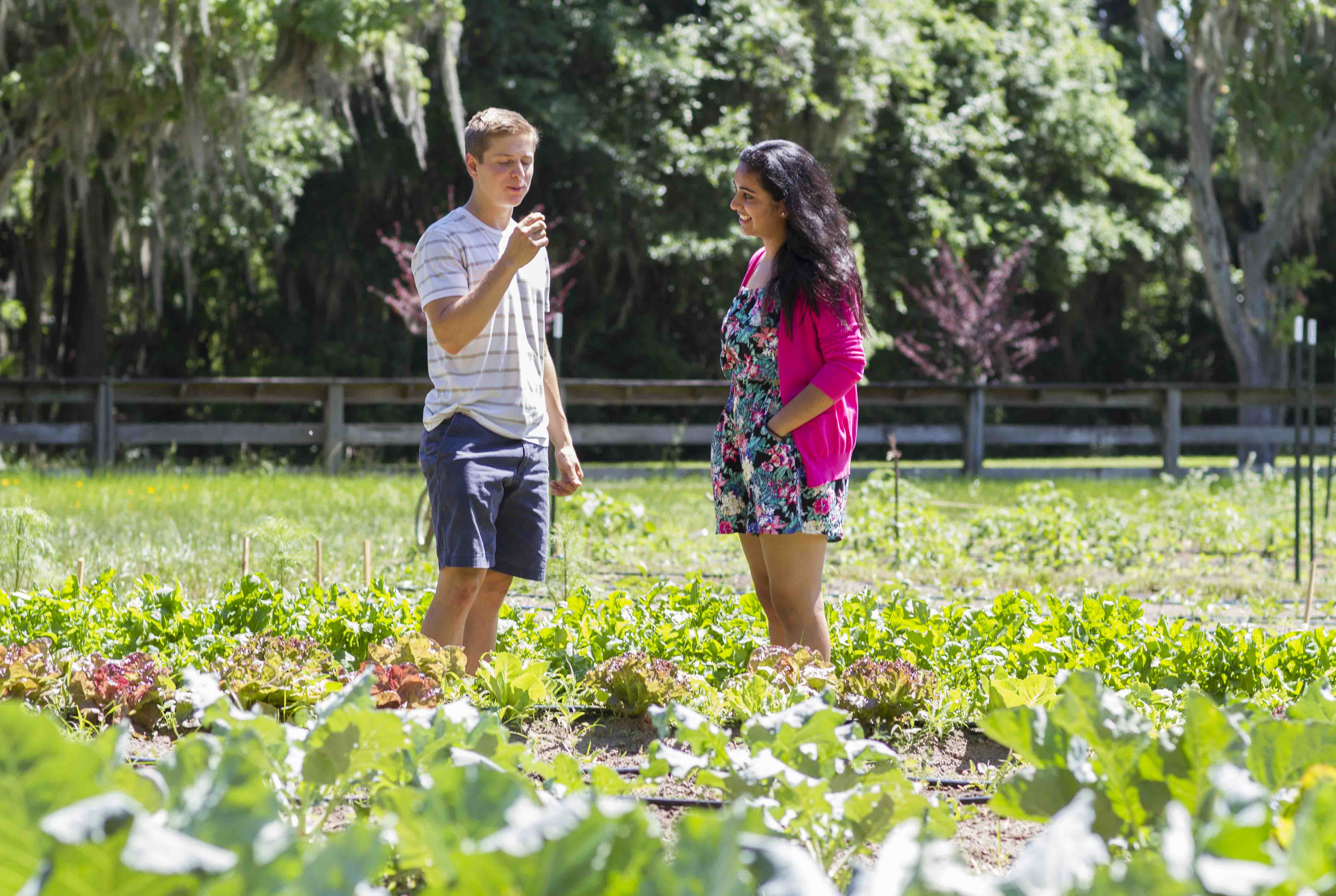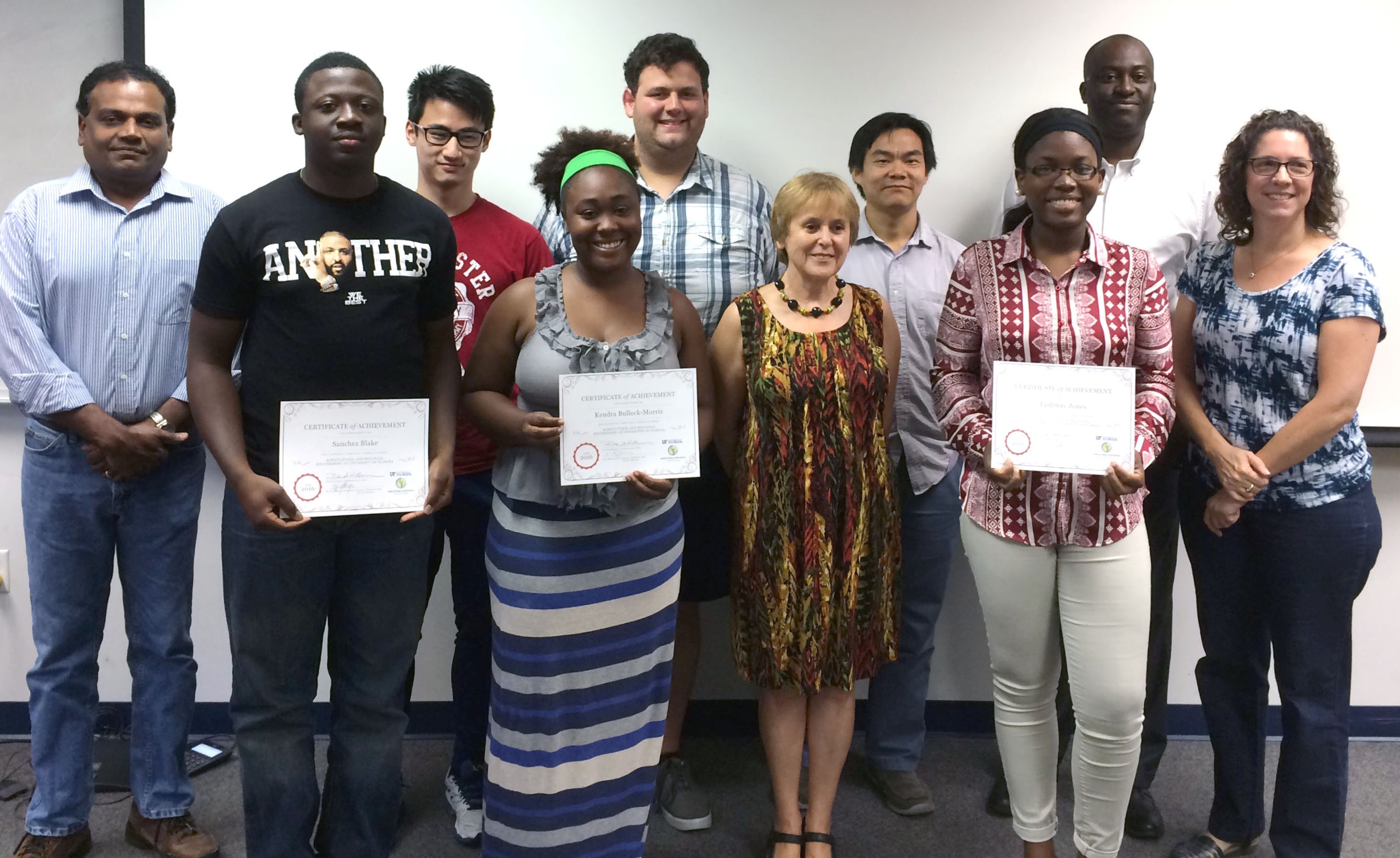The University of Florida department of agricultural and biological engineering (ABE) and Bethune-Cookman University developed a new summer internship program that allows Bethune-Cookman undergraduate students to gain hands-on research experience at UF.
UF/CALS Student Elected to 2016-17 National FFA Organization Officer Team
By Dana Edwards, CALS Strategic Communications Manager (BSJ 14, BA 14)
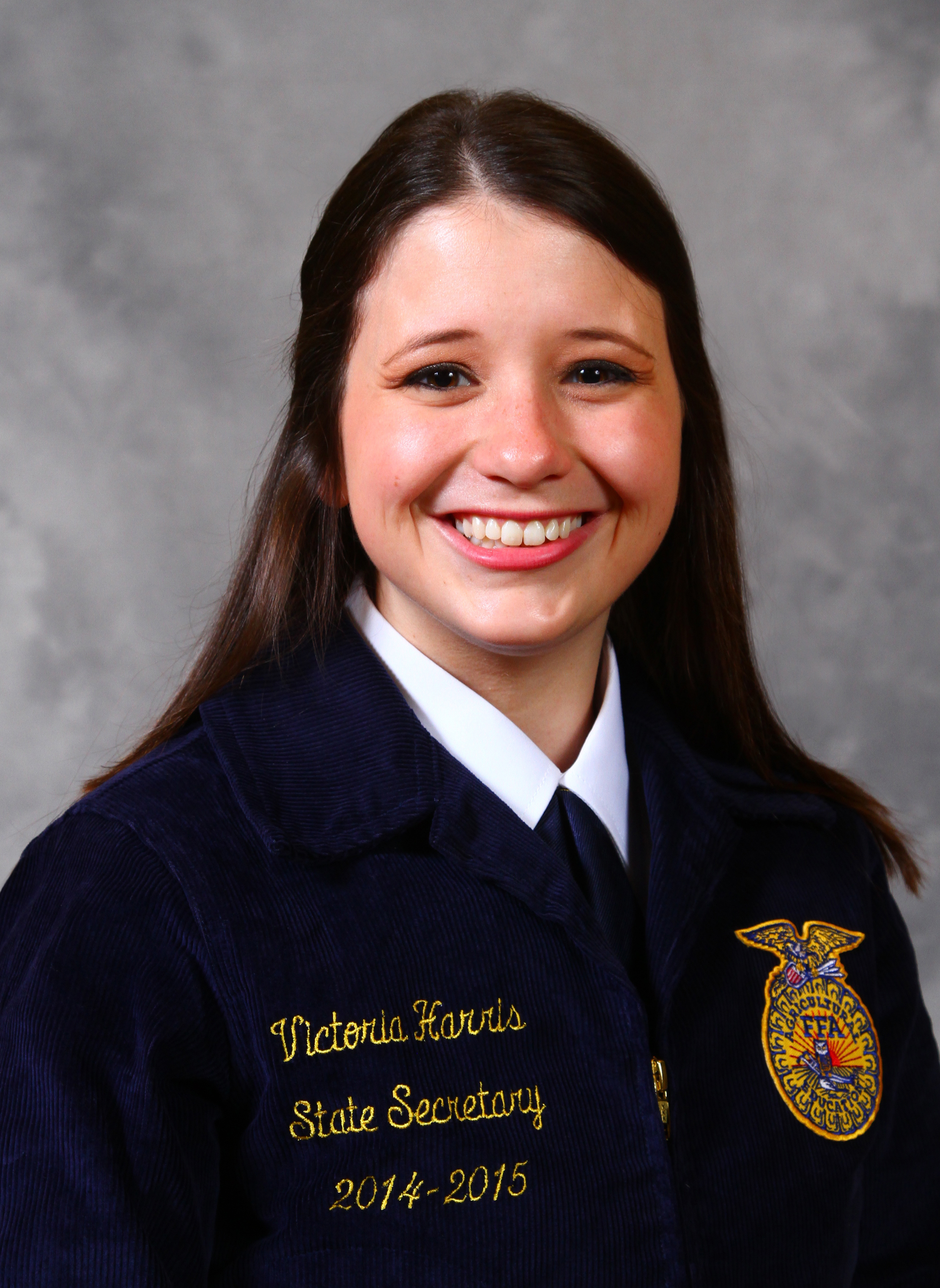
Victoria Harris, a sophomore biology major and leadership minor in the University of Florida College of Agricultural and Life Sciences, was elected to serve in the office of secretary, similar to a vice president role, on the 2016-2017 National FFA Organization officer team.
Since 1988, 10 CALS students have served as National FFA officers, an honor not many universities can claim. Harris receives a $2,500 renewable scholarship from CALS for this prestigious honor.
“CALS students are active servant leaders who promote agricultural education in their communities as well as at UF,” said CALS Dean Elaine Turner. “Victoria is an exemplary model of the high caliber students in our college.”
National FFA officers commit a year of service to the National FFA Organization, traveling more than 100,000 miles around the world to interact with business and industry leaders, government and education officials, sponsors and FFA students, teachers and state officials. The six officers will also host leadership and personal growth workshops for FFA members across the country.
“This is an incredible honor and I’m thankful to be able to give back to an organization that means so much to me,” Harris said.
Harris is a past Florida FFA state officer, where she served as secretary. Harris’ preparation for national office as the state delegate included weekly meetings with individuals from the Florida FFA, CALS and the Florida Farm Bureau. The meetings honed her knowledge of current agricultural issues and how local and national entities connect policy influencing research to the classroom.
“Victoria is a one-of-a-kind individual with big ideas and sound reasoning,” said Andrew Thoron (MS 07, PHD 10), an agricultural education and communication professor with UF/IFAS. “Her qualities lend her to be a great leader for the National FFA Organization and a standout among our best students in CALS.”
Harris aspires to be a veterinarian who is actively involved in her community as a mentor to others involved in FFA and in her profession. She came to FFA through an uncommon route as a high school student interested in joining pre-vet groups.
“Two months after joining, I was showing my first cow!” Harris said. “Most FFA members begin in the agriculture world and immediately join as middle school students. Not many people know FFA is available to them as a leadership development resource even if they do not have prior agriculture experiences. That’s how I joined. I want others to know about the immense leadership and career success opportunities FFA provides inside and outside of the classroom.”
UF/CALS Students Win National Packaging Design Award
By Dana Edwards, CALS Strategic Communications Manager (BSJ 14, BA 14)
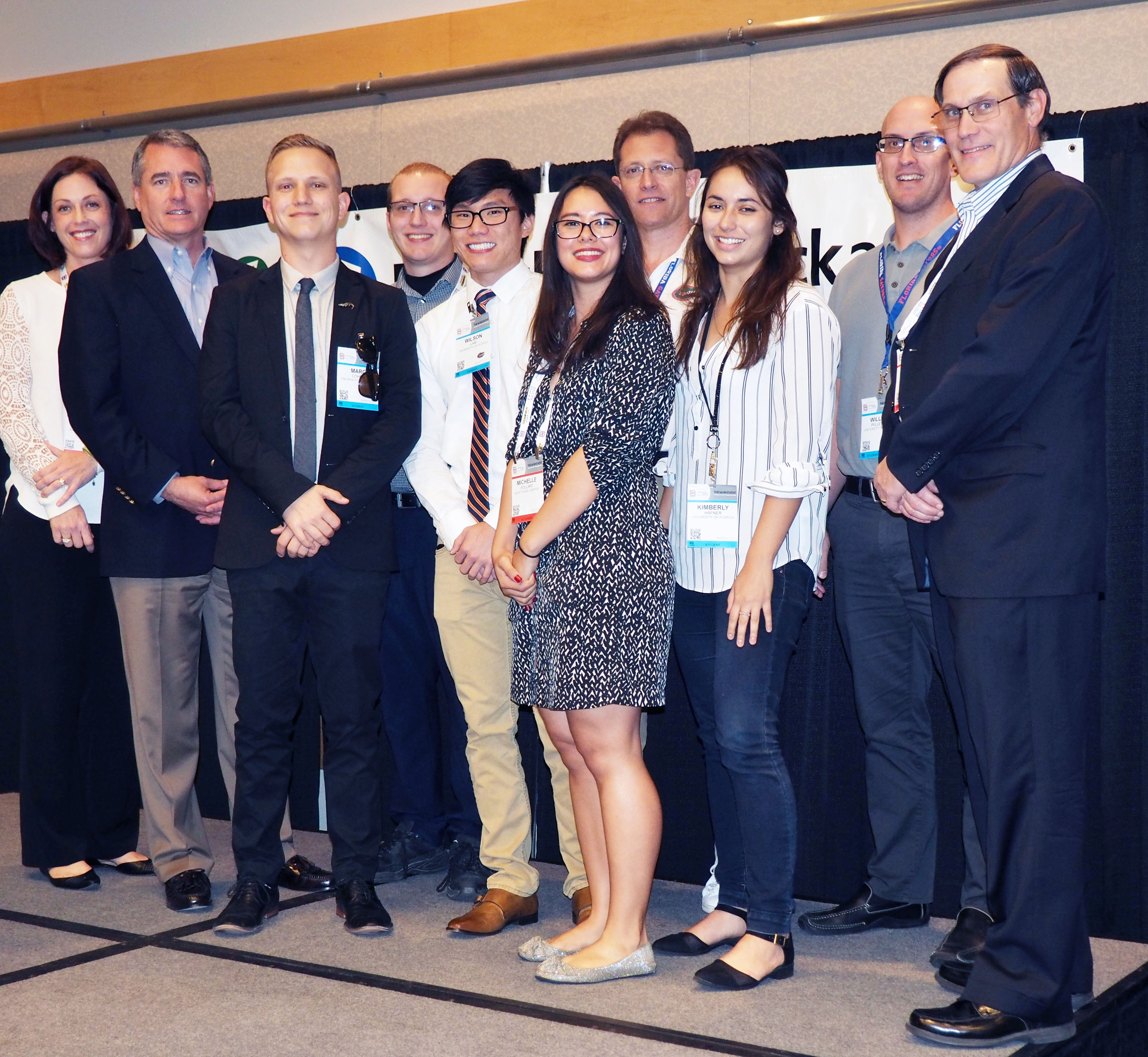
For almost a year, a team of University of Florida biological engineering students with minors in packaging science prepared for the national 2016 Paperboard Packaging Alliance (PPA) Student Design Challenge. The team competed in the previous year’s competition and were determined to place in the 2016 competition. Their hard work paid off. The UF team placed first out of a total of 72 entries.
The 2016 Student Design Challenge winners were announced at a luncheon on Nov. 7 at the PACKEXPO in Chicago. The PPA competition began in 2004 with the goal of fostering awareness and appreciation for paperboard packaging among university students. The UF team received a $5,500 cash prize to share with one another and the UF packaging program received a $5,000 prize as well. The students also received $3,000 in travel scholarships to the conference.
“Congratulations to the 2016 Student Design Challenge winners,” said American Forest & Paper Association President and CEO Donna Harman. “Their paperboard packages stood out among designs from 16 schools – the highest participation rate since the challenge’s inception.”
The winners were selected based on their response to the competition scenario, innovative structural and graphic design, and functionality and quality of the finished product. Students were tasked with designing an innovative package for dry goods, in which the structure of the package would enhance the function while standing out on upscale grocery store shelves.
“We are very proud of the winning team and their efforts,” said faculty adviser and UF/IFAS agricultural and biological engineering professor Bruce Welt (PHD 96). “Their winning package design required the use of a number of design tools that students learn in our (College of Agricultural and Life Sciences) classes, so it is particularly satisfying to see students put that learning to good use. We must express our sincere thanks for the support and assistance from UF packaging alumnus Anthony Shun (BS 05) and Don Scott of Malnove, Inc.”
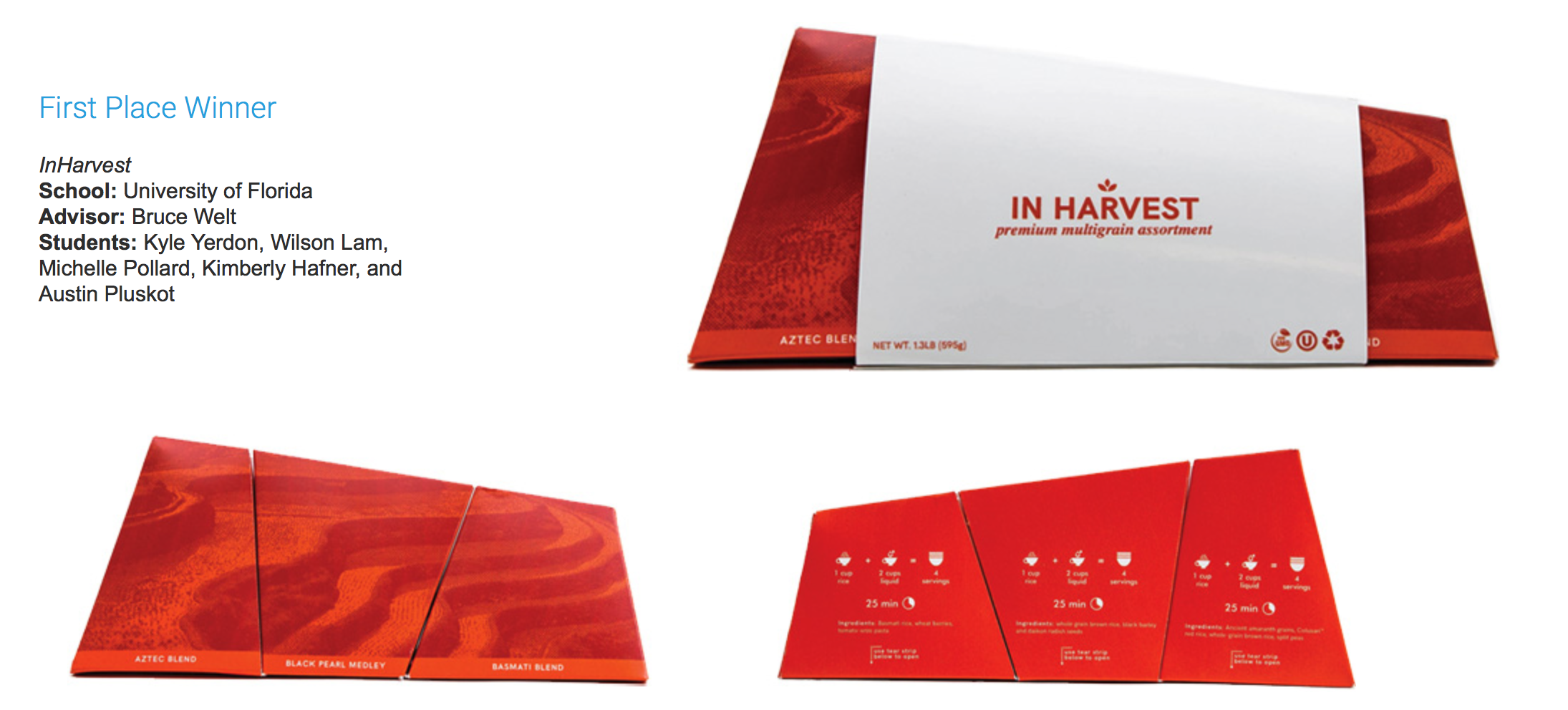 The package the students designed contained three types of rice in a skewed triangular shape. Each of the three divisions had a different shape, but each held exactly one cup of rice. The team named their product “InHarvest,” and judges referred to the design as “beautiful” and “elegant.”
The package the students designed contained three types of rice in a skewed triangular shape. Each of the three divisions had a different shape, but each held exactly one cup of rice. The team named their product “InHarvest,” and judges referred to the design as “beautiful” and “elegant.”
The following graduates were part of the winning PPA Student Design Challenge UF team:
• Kimberly Hafner (BSBE 16) of Citrus Springs, Fla.
• Wilson Lam (BSBE 16) of Arcadia, Fla.
• Austin Pluskot (BSBE 16) of Okeechobee, Fla.
• Michelle Pollard (BSBE 16) of Orlando, Fla.
• Kyle Yerdon (BSBE 16) of Seffner, Fla.
Teaching Practical Applications and Life Skills Through the Agricultural and Natural Resource Law Minor
By Dana Edwards, CALS Strategic Communications Manager (BSJ 14, BA 14)
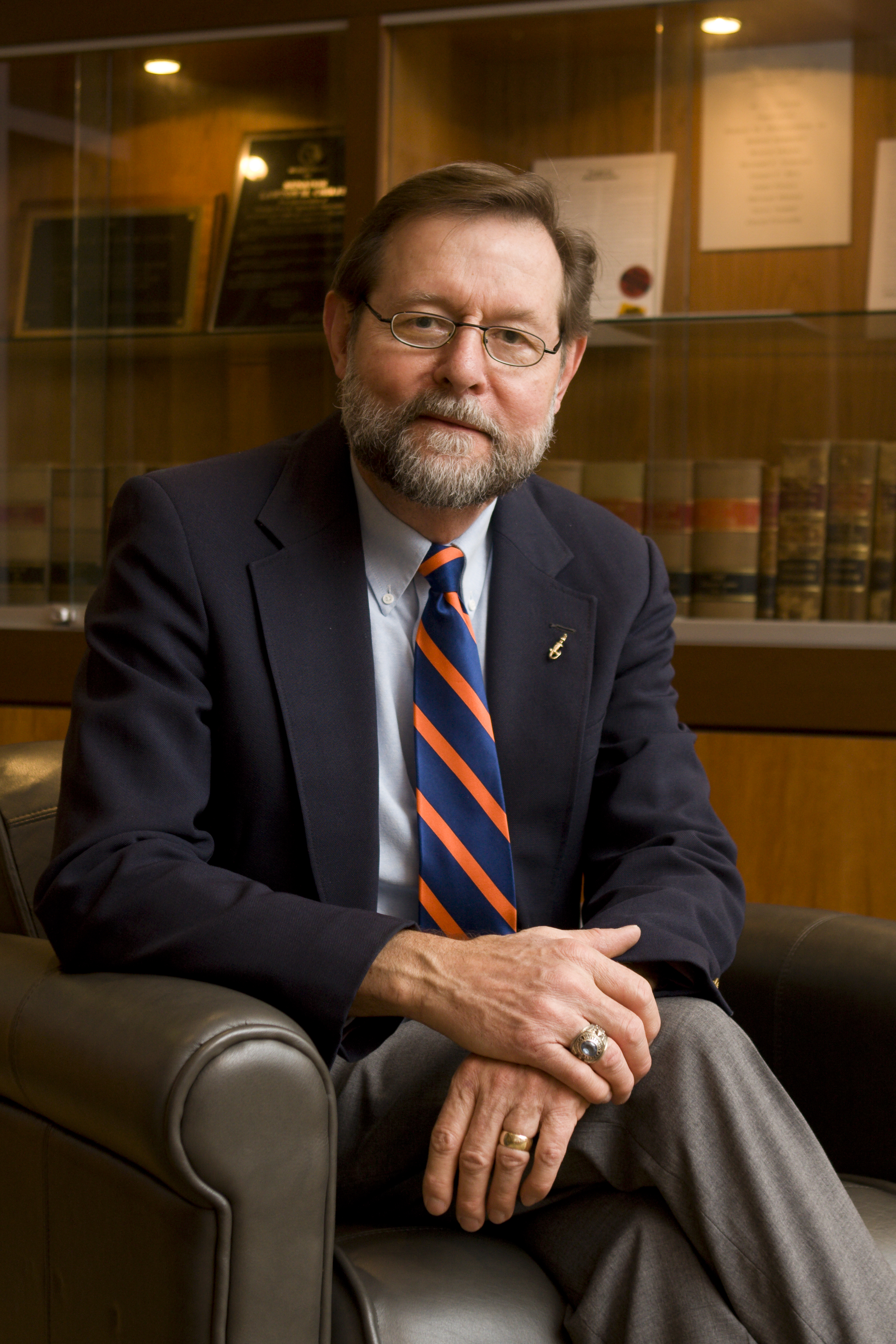
When Michael Olexa (MS 73, PHD 76) sought to establish the first undergraduate agricultural and natural resource law minor in the country at the University of Florida’s College of Agricultural and Life Science (CALS), he had two primary goals for student learning outcomes: to prepare students for the work place following graduation, and to enhance their employability.
Since Olexa’s founding of the minor in 2000, the food and resource economics professor said he’s received inquiries from West Virginia University and The Ohio State University for advice to model similar programs on their campuses after UF/CALS.
Olexa has noticed the growing desire of employers to hire students who can assess situations and identify potential legal issues or hurdles. “Employers want employees who understand regulation and can put that to use in the work place,” he said. Over the years, Olexa’s students have informed him that the minor gave them a leg up on the competition when applying for jobs.
“I interviewed with the Southwest Florida Water Management District and they made it a point to express how glad they were to see how I had that minor,” said Nick Andreacchio (BA 17), now a UF soil and water sciences graduate student. “Even though I’m hoping to conduct research or work in the field, they still thought it was beneficial and applicable to any work environment within their organization.”
The agricultural and natural resource law minor is open to undergraduate students from all disciplines who wish to learn business, environmental and social regulatory issues related to the production of food, fuel and fiber. Olexa estimates that approximately 400 students have completed the minor.
About 15-20 percent of Olexa’s students go on to law school. These students have been accepted at schools such as UF, Florida State University, Florida Agricultural and Mechanical University, Stetson University, Nova Southeastern University, Yale University, Harvard University, the University of Chicago and the University of Virginia. Other students have earned jobs in the Florida Department of Agriculture and Consumer Services, the Environmental Protection Agency, water management districts, the citrus industry, the international trade industry, the U.S. Department of Agriculture and the Florida Farm Bureau.
Through the 15-credit program, agricultural and natural resource law students learn risk management in the work place, contract law, business structures, administrative agency dealings, hiring practices, how to work with difficult employers and employees, the importance of doing background research, and proper social media etiquette.
“Legal language is so different than our common vernacular,” said Ashley McLeod (BSA 16), public relations specialist for the UF/IFAS Center for Public Issues Education. “You become more familiar with legal language and you don’t get that in other college courses, specifically language for voting and amendments. In one of the classes you do case studies throughout the semester and they challenge you to think outside the box. You can apply these lessons to your daily life.”
Olexa believes it is important for students to gain practical advice in his courses, and scatters little quips throughout his lessons. “Better to form a friendship from a business relationship than a business relationship from a friendship” and “what the large print giveth, the small print taketh away” are just a few of these sayings.
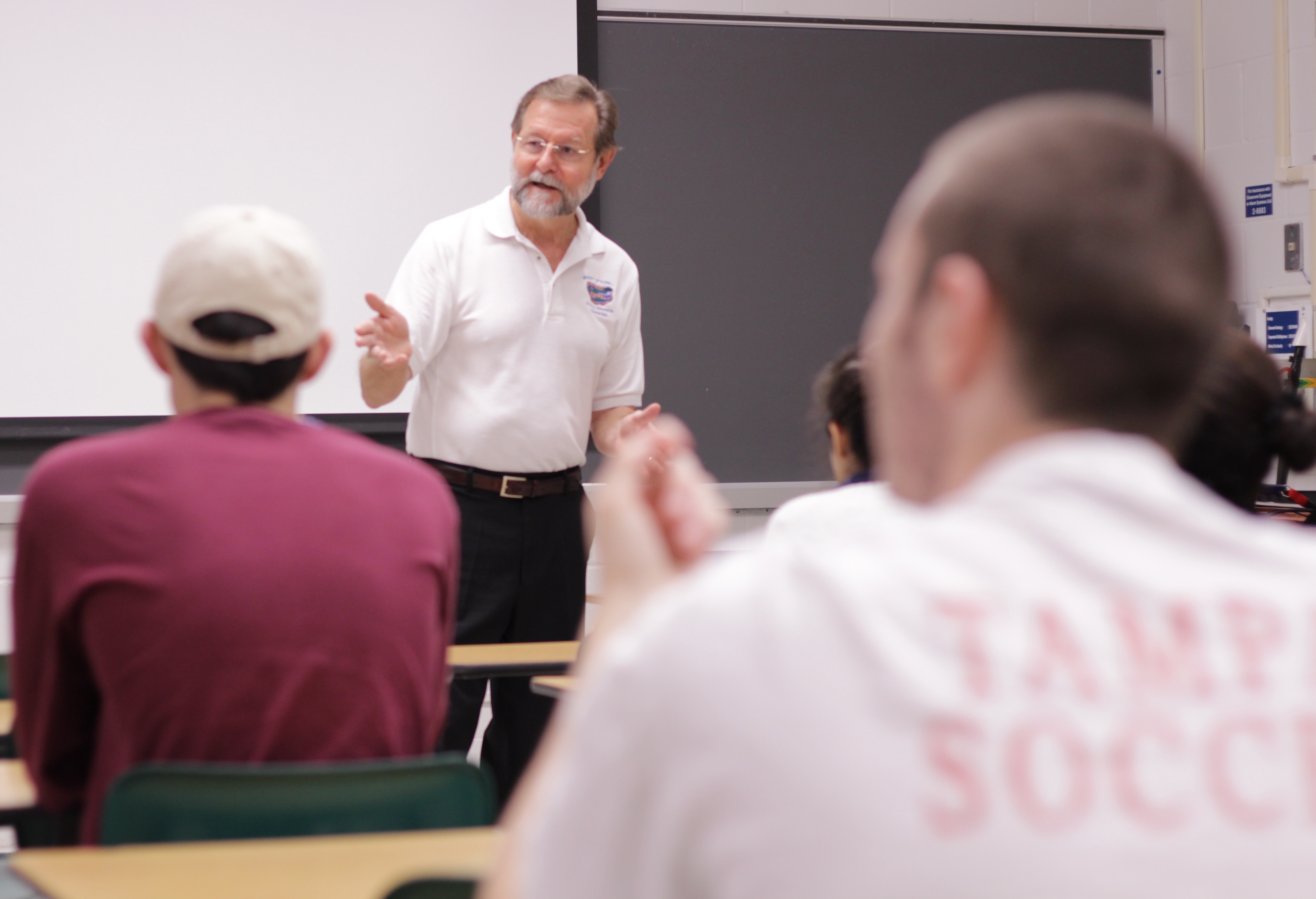 “ ‘Get everything in writing’ is his favorite nugget of knowledge,” said McLeod. “If you have a conversation with him and he says you’ll be excused for a class, you can’t hold him to it if you didn’t get it in writing. The practical skills and knowledge he provides are the most beneficial lessons I gained from the core classes he teaches.”
“ ‘Get everything in writing’ is his favorite nugget of knowledge,” said McLeod. “If you have a conversation with him and he says you’ll be excused for a class, you can’t hold him to it if you didn’t get it in writing. The practical skills and knowledge he provides are the most beneficial lessons I gained from the core classes he teaches.”
Students are quick to share how much it means to them that Olexa is determined to learn the names of every student in his classes. He also has them fill out a biography of themselves so he can learn a little bit more about them inside the class setting.
“I utilize the role-playing method – or Socratic method – frequently, and the lesson is a lot more meaningful when I can call on a student by name,” Olexa said. “If they have a certain bias toward a discipline, I will ask them to argue the opposing side. In the real-world, it’s better to know both sides of an issue well.”
Overtime, Olexa has noticed more students joining the minor from other UF colleges outside of CALS. He has even had students change career paths because of the minor.
“The minor has provided a bridge with other colleges,” Olexa said. “The courses have proven to these students how critically important agriculture is to the state of Florida. I have had students tell me they had no idea that agriculture was such an important economic and natural resource base for Florida, or how much law and regulation are woven into agricultural and natural resource decisions in this state.”
In addition to his courses in CALS, Olexa also teaches at the UF Levin College of Law and serves as director of the UF/IFAS Center for Agricultural and Natural Resource Law located in the department of food and resource economics. He fashions several life experiences into teachable moments, including military service, owner and operator of a business, policy adviser in the Office of the Secretary of Agriculture for the USDA, and chair of the Agricultural Law Committee of The Florida Bar, among others. However, being a professor has added much value to his personal life.
“To look at what my students have accomplished, that has really made my life very full,” Olexa said. “I can’t think of a better reward than that.”
If you would like to support the UF/IFAS Center for Agricultural and Natural Resource Law, please click here.
UF/CALS Students Win National Innovative Food Product Award
By Dana Edwards, CALS Strategic Communications Manager (BSJ 14, BA 14)
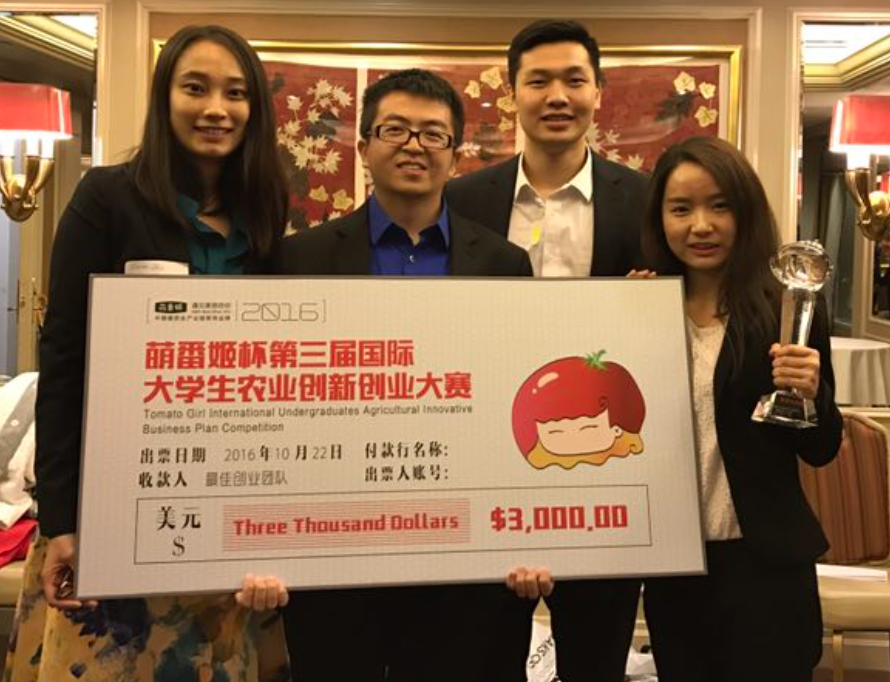
After previously earning first place in a 2015-2016 Ocean Spray® student food product development competition for their creation of a frozen breakfast item, Shaomin Zhao (MS 16) and Ruiqi Li were encouraged to continue challenging their skills in creating new food products.
The two Ph.D. students in the UF/IFAS food science and human nutrition department asked three of their fellow graduate students Brian Wada, Chi Gao and Christopher Baker to join them in entering the 2016 national Food System Network Innovation Competition. In what seemed like an episode from Food Network’s show Chopped, the students were given the task of creating a nutritious and flavorful food product out of tomatoes.
“We conducted a market analysis first and found snacks to be a large desire for students and working adults,” said Li, the team leader. “People are always on the go and looking for ways to eat healthy.”
The team developed “Cramato Dippers” – a snack-pack of tomato flour crackers with salsa dipping sauce. The snack was all vegan, 135 calories, low in price at $2.49 for two servings, and high in protein, dietary fiber and vitamin A.
“This product is good for preventing dry eyes, such as when people are working at their desks and looking at computer screens for extended periods of time,” said Li.
In addition to developing the prototype of this product, the students had to conduct market research and draft an advertising plan. The team developed these products over the course of about a month and a half.
The UF team was selected as one of five teams across the nation to advance in the second round of competition. The competition consisted of two teams from Cornell University, a team from Pennsylvania State University and a team from the University of Chicago at Urbana-Champaign. The UF team placed first, earning $3,000 for the team and internship offers from the challenge’s co-organizer, Beijing Homology of Medical & Food Source Technology, Co., Ltd.

“This was a tough competition,” said Zhao. “To succeed, each team needed to know nutrition, marketing, advertising, food science, food safety and the food industry. We found it helpful to learn from the other schools as well and expand our networks with them.”
The co-organizer encouraged the UF team to continue their research and further development of the Cramato Dipper product. Li said the team hopes to continue working on the project to eventually sell to a company.
“These are self-motivated students who have a strong desire to compete and win,” said Liwei Gu, the students’ faculty adviser and an associate professor in the food science and human nutrition department. “Support from our department is also critical [to their success].”
Li said the team was thankful to have received not only travel assistance to the competition from their department, but also time to practice their presentation in front of several faculty members before the contest.
Sisterly Competition: The Path to Graduation
By Dana Edwards, CALS Strategic Communications Manager (BSJ 14, BA 14)
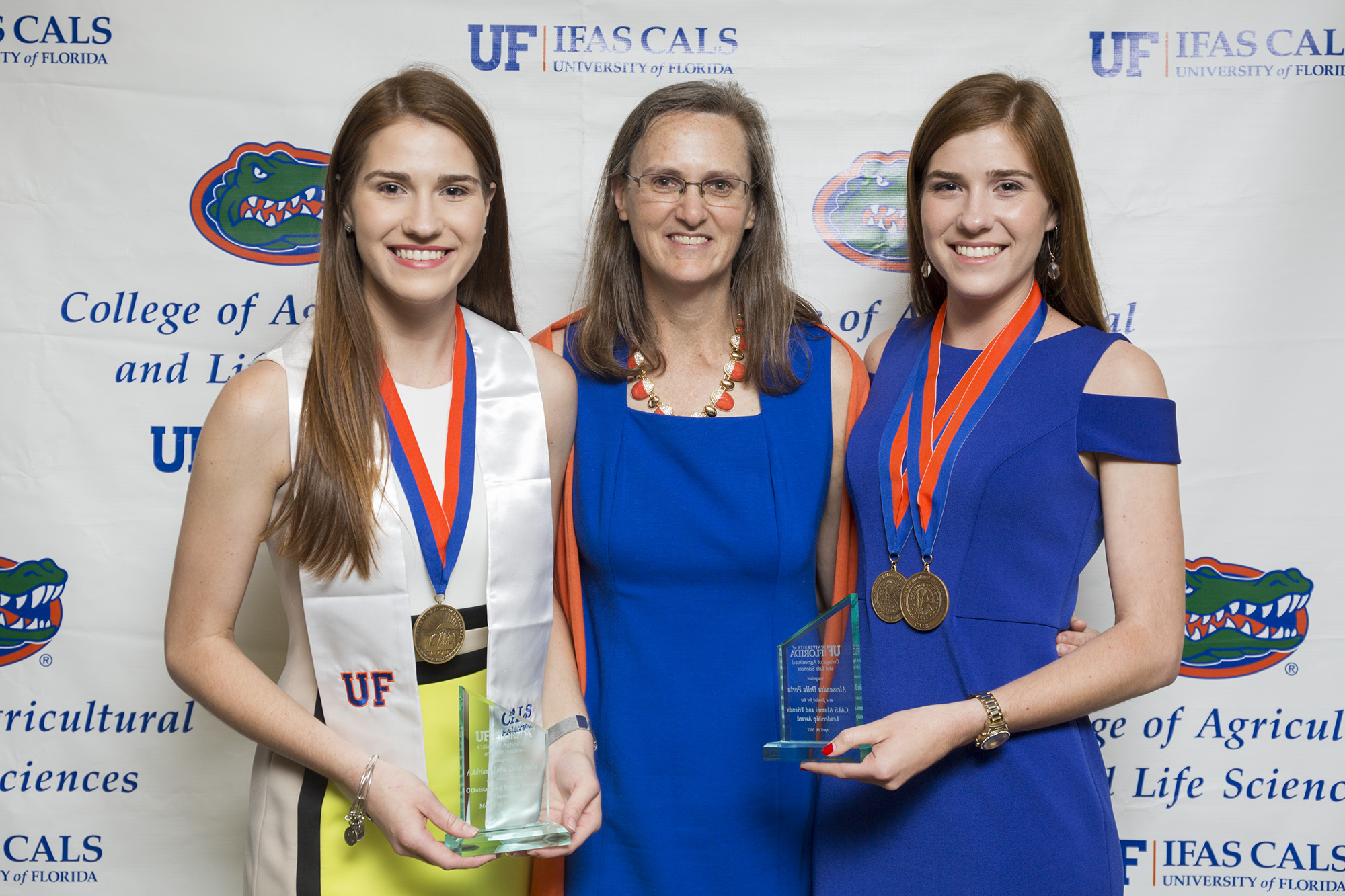
With more than 52,000 students at the University of Florida, the competition for leadership positions in student organizations, research opportunities and internships can be stiff. For Alessandra and Adriana Della Porta (BSA 17), competition hits close to home – or rather resides at home.
The twin sisters from Ponte Vedra Beach both study microbiology and cell science with goals of becoming medical doctors. Together they graduated from the UF College of Agricultural and Life Sciences (CALS) with their peers on April 29 at 7 p.m. in the Exactech Arena at the Stephen C. O’Connell Center.
Even with similar career aspirations, the sisters crafted individual experiences at UF with regard to research, involvement and career plans.
“At the end of the day, we’re in competition, so that’s been really difficult,” Adriana said. “But we can shine because we’ve put our efforts in different places in (CALS) and at UF to maintain our independence. Because of this, we can truly be happy for one another and support one another. We’ve made our own names for ourselves – we aren’t ‘Adriana’s sister’ or ‘Alessandra’s sister.’”
That support has been crucial to their individual successes at UF. The sisters were roommates since sophomore year and liken the experience to having a “built-in study buddy.” Having a companion who identified with similar feelings during times of stress was a comfort to each of them.
“It’s a unique experience not a lot of people have,” Adriana said. “Half my household came with me to college and not many people can say that.”
Alessandra and Adriana were nervous when they discovered they would both be up for CALS senior awards. They were relieved to find they wouldn’t be finalists for the same award. Alessandra was named the recipient of the CALS Alumni and Friends Leadership Award and Adriana received the J. Wayne Reitz Medal of Excellence at the CALS awards ceremony held April 18.
The Family Business
Alessandra and Adriana have been intrigued by the medical world ever since they can remember. When the girls were younger, seven close family members passed away. This grieving experience led Adriana and Alessandra to have a strong desire for the medical profession.
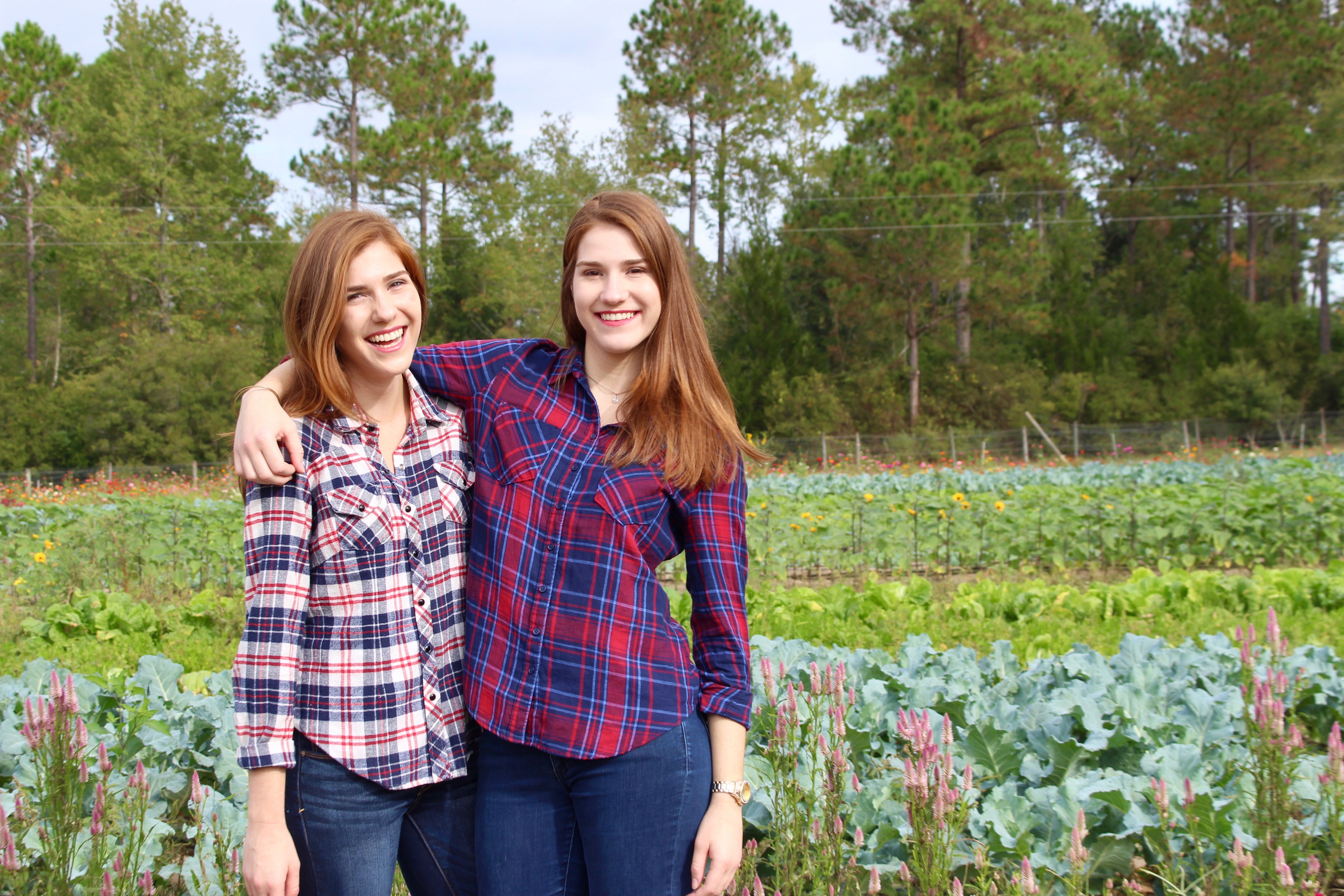
“Our mom tells this great story of how we picked up the television remote while she was working; she looked up and saw us watching a surgery. We were about four or five years old at the time,” said Alessandra. “She said she’s always known we would do something in the medical field.”
A medical career is a new occupation to the Della Porta family. Adriana and Alessandra’s mother, Veronica Della Porta, works in insurance and took over the company her father started in 1968. The twins remember spending their summer breaks alphabetizing files and helping their mom around the business. They continue to help out remotely from Gainesville.
“Our mom could see (insurance) was not something we were passionate about,” Adriana said. “It was a challenge saying ‘no’ to the family business. Our grandpa always thought all of our family would want to continue doing that. Mom has acted as an advocate for us to follow our dreams.”
Raised by their single mother, Alessandra and Adriana learned the values of hard work and determination from her actions and outlook on life. These lessons helped the twins understand the amount of studying and discipline it takes to be a pre-med student.
“Because our mom had to do so much on her own, she was a good role model for us,” Adriana said. “We are incredibly independent and were capable of handling things like laundry and cooking before college. Our mom has ingrained a strong work ethic in us that I know will help us both succeed in medical school.”
Exploring What CALS Has to Offer
The Della Porta twins came to CALS without an agricultural background. Adriana was introduced to the college after she decided to take the course Plants, Plagues and People during the first semester of her freshman year. From that class, her professor Brantlee Spakes-Richter encouraged her to look into the CALS Challenge 2050 Project.
“She’s the one who noticed I was gravitating toward population growth and public health concern topics in agriculture,” Adriana said. “She directed me to ways I could further explore those interests and I’ve been a teaching assistant for that class two times since.”
After inquiring about the Challenge 2050 Project, Adriana met with the program’s director, Tony Andenoro, to learn how she could become involved. The Challenge 2050 Project aims to develop the capacity to meet the needs associated with an expected population size that will exceed 9.6 billion by the year 2050. From her experiences with the project, Adriana added the CALS leadership minor to her studies. She says her minor is just as critical as her major because it’s where her bedside manner comes from when working with patients.
“My advice to incoming students is to not be scared of trying something completely new,” Adriana said. “If you find something that excites you outside of your major track, don’t be afraid to explore that – you can make them work together.”
Her work with the Challenge 2050 Project led her to a maize genetics research project at Fifield Hall. In her research, Adriana looks at how to increase the crop yield during stressful conditions, such as flood and drought. The research can also apply to grasses such as sorghum, wheat, millet and rice.
In addition to becoming a CALS Ambassador, serving on the Dean of Students Office Student Code of Conduct Committee, and working as a counselor for the inaugural CALS Florida Youth Institute, Adriana joined Sigma Alpha, the agricultural professional sorority. Adriana found her fellow students and professors to be open to learning from one another. She likens CALS class discussions to the typical college experience one would find on a television show or movie.
“CALS is a perfect representation of what college is supposed to be,” Adriana said. “The diversity the college has to offer broadens your mind and perspective. Not every college is like that.”
A CALS Conversion
To distinguish her college experience from her sister, Alessandra initially majored in a different college at UF. But she quickly discovered it wasn’t the right path for her.
“I wrote this awful paper for a class in my previous college,” Alessandra said. “Writing hasn’t always been my strong suit. I knew I wanted to find opportunities to strengthen my communication skills and CALS had them. I realized my goal was to write an honors thesis before graduation.”
After hearing how much her sister enjoyed her major and CALS experience, Alessandra made the switch her sophomore year.
“I specifically remember asking Bryan Korithoski, an IFAS lecturer, ‘How do I CALS?’” Alessandra said with a laugh. “I had so many questions and he and Monika Oli, my advisers, helped me through everything.”
Korithoski and Oli, an IFAS senior lecturer, assisted Alessandra in her understanding of the various occupations a microbiologist can pursue through a careers seminar. Through their guidance, Alessandra successfully completed a summer internship with the Mayo Clinic where she was able to work with researchers to develop new cancer therapies.
“What sets [Alessandra and Adriana] apart from other students is that they aren’t stagnant,” Korithoski said. “Every semester they try to better themselves in some way. Students often think there is a linear way to med school. Even identical twin sisters have different paths of getting there.”
Alessandra jumped into activities within the college. She joined Sigma Alpha and will finish out her term as president this semester. Sigma Alpha has been able to partner with CALS to host the first annual “Thank a Teacher Week” to recognize faculty mentors like Korithoski and Oli. She took on a medical anthropology minor and accepted an executive role in the UF Center for Undergraduate Research Board of Students, holding a weekly science club for the middle schoolers to give back to the Gainesville community.
The once writing-shy senior has now completed her CALS honors thesis on the research she conducted at UF Health Shands Hospital regarding chronic surgical site infections. Alessandra’s thesis addresses a staining method she developed that would make it easier to detect infections. This research has led her to an interest in emergency medicine.
“Without CALS’ resources and classes, I would never have been confident enough to write a 27-page thesis,” Alessandra said.
A Bright Future
Common words the twins’ professors and advisers use to describe them are: “driven,” “bright,” “engaging,” and “a strong sense of integrity.” With medical school on the horizon, Adriana will coordinate clinical trials for cardiac patients at UF Health Shands Hospital and Alessandra will be working as an emergency medical technician immediately after graduation.
Sigma Alpha adviser and IFAS lecturer Becky Raulerson (BSA 98, MS 00) has worked with both Adriana and Alessandra in their capacities as Sigma Alpha members and with Adriana as a Florida Youth Institute counselor. Raulerson believes CALS is lucky to have the “double gift” of working with and fostering the talents of both young women.
“When they finish medical school, I’ll be the first to sign up as their patient,” Raulerson said. “It’s been a blessing in my life to work with the both of them.”
Accepting Academic Challenges and Disproving Skeptics
How a UF/CALS Ph.D. Student Overcame Obstacles to Pursue Her Career
By Dana Edwards, CALS Strategic Communications Manager (BSJ 14, BA 14)
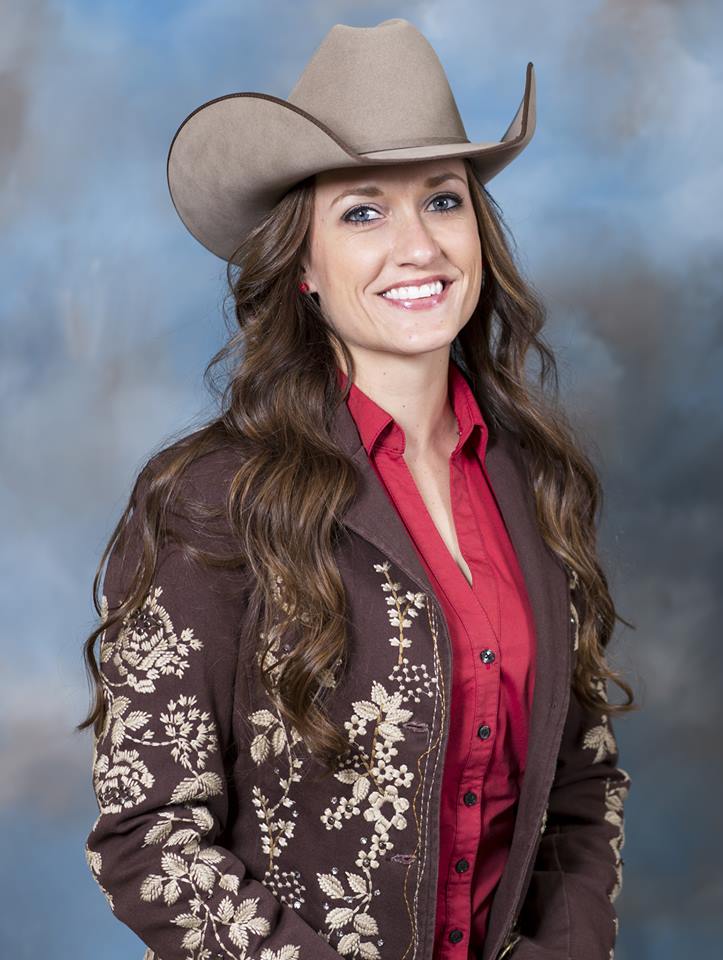
College was never a thought in Leigh Ann Skurupey’s (MS 12, PHD 17) mind as a high school student. Now, she’s a graduate from the University of Florida College of Agricultural and Life Sciences (CALS) with a doctorate in animal sciences.
The CALS graduate began her higher education journey in an effort to change people’s minds about her abilities. Skurupey has dyslexia, a learning disability that makes learning to read and interpret words, letters or symbols difficult. School has always been harder than usual for her as she works daily to overcome her reading challenges.
As a high school student, Skurupey overheard her mother telling her younger brother he needed to work on improving his grades. Skurupey’s brother asked why their mother didn’t scold her for lower grades, to which their mother replied, “she’s just not quite smart enough.”
“Once I heard her say that, it was my only reason why I went to school – to prove her wrong,” Skurupey said.
Skurupey said her family is supportive of her education goals. Several years after she graduated from Northeastern Junior College in Sterling, Colorado with a 4.0 grade point average, Skurupey explained that her motivation came from her mother.
“She hadn’t realized I overheard that conversation years ago,” said Skurupey. “She had wondered what sparked my drive for higher education. She fully understood my desire to go to college after hearing that.” Skurupey said.
Scholarships have completely funded Skurupey’s education, due to her academic success and pursuit of unique scholarships. She even earned a scholarship for stamp collecting, a past hobby of hers. The scholarships continued to motivate her to do well in school. She transferred to Colorado State University and graduated with bachelor’s degrees in equine sciences and animal sciences.
A UF College Career
The opportunity to work toward a master’s degree in animal sciences presented itself to Skurupey in the form of an assistantship working as the coach for UF’s horse judging team. UF/IFAS associate professor and state extension equine specialist Saundra TenBroeck identified her as an outstanding member of Colorado State University’s top ranked horse judging team, precisely when UF was looking for a coach of their own.
“Leigh Ann is driven; she’s not someone who settles for mediocrity from herself or her team members,” TenBroeck said. “The desire to better herself is very present. She is truly competitive, and a person of compassion. Whatever she puts her hand to, she does her very best at it. Her desire to excel is contagious.”
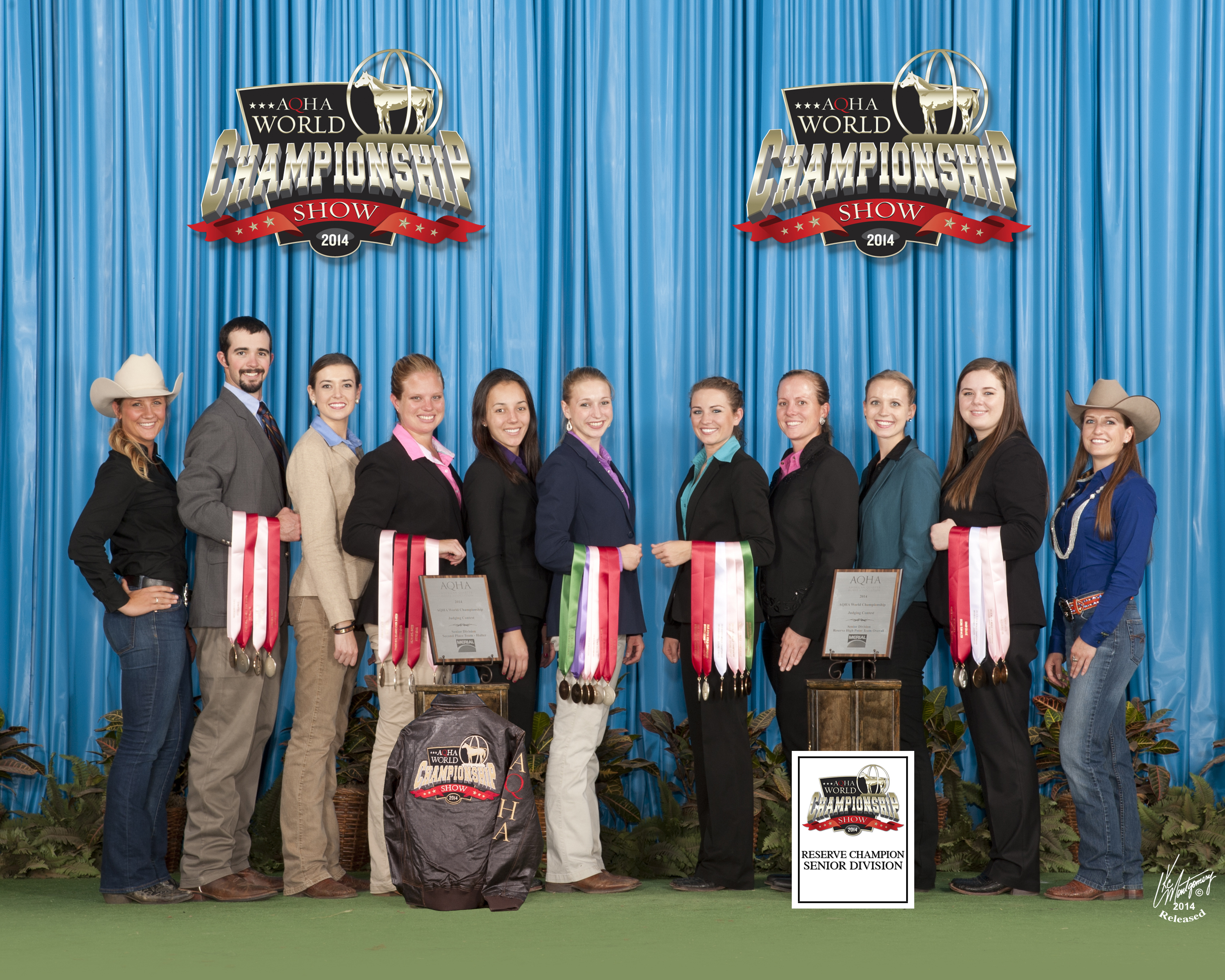
Skurupey continued as coach of the UF horse judging team when she began her Ph.D. in animal sciences. Under the direction of Lori Warren, a UF/IFAS equine nutritionist, Skurupey’s dissertation took an environmental approach to the equine industry. She experimented with different calcium quantities and sources in horse feed to reduce phosphorous amounts released into the environment.
TenBroeck said Skurupey was deeply invested in the UF horse judging team. In 2016, the UF horse judging team placed 3rd in the world under Skurupey’s guidance. But Skurupey was even more devoted to the students who were a part of the horse judging team.
A few years ago, when a UF team was particularly successful in its competitions, Skurupey raised the money to have special belt buckles made for each student to recognize their hard work. When the assistant coach for the team finished graduate school, Skurupey made a personalized collage for her.
“[Leigh Ann] is a person who pays attention to the detail that makes memories tangible and that much more special,” TenBroeck said. “She’s so generous with her time, talents and finances.”
In addition to her assistantship responsibilities, Skurupey became heavily involved in various opportunities CALS and UF/IFAS Extension provides. There’s a rather lengthy list of all the activities Skurupey has volunteered for: horse clinics with 4-H and National FFA, horsemanship school, Southern region horse championships, eastern national 4-H round-up, IFAS Extension programs in Alachua County, exercise physiology demonstrations, guest lecturer for the Intro to Animal Science course, lab teaching assistant for the Endocrinology and Reproduction of Farm Animals course, substitute lecturer for TenBroeck’s animal nutrition courses, and the list continues.
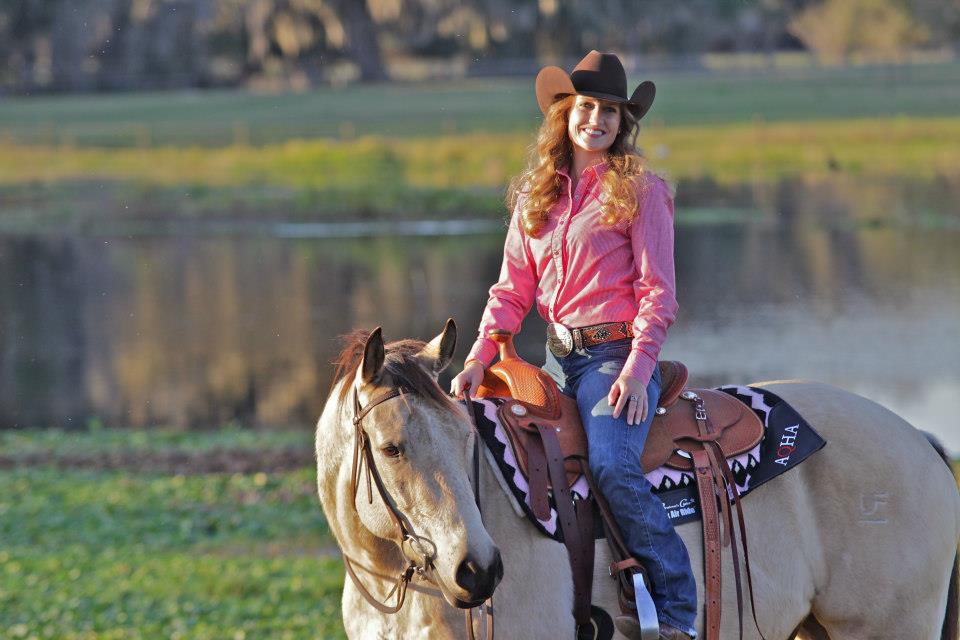 TenBroeck estimates Skurupey has impacted hundreds of students of all ages.
TenBroeck estimates Skurupey has impacted hundreds of students of all ages.
School Struggles
Graduate school didn’t come easy to Skurupey. She had to write study materials in different colors through continuous repetition due to her dyslexia. Spelling, grammar and writing were her more difficult obstacles to overcome. She had the right mentor and advisor in Lori Warren, who put in the extra time to make sure writing details were covered and edited.
“What does anyone do who has a disability or other obstacle that needs to be faced? You have people who love you, care about you, and who are willing to help you shine where you shine. Dr. Warren has done just that – she’s helped Leigh Ann be excellent where she’s excellent,” TenBroeck said.
The amount of attention CALS faculty have invested in Skurupey’s success is a testament to the college’s commitment to its students. This is not something unique to Skurupey’s experience, but a characteristic one can find in every department within CALS.
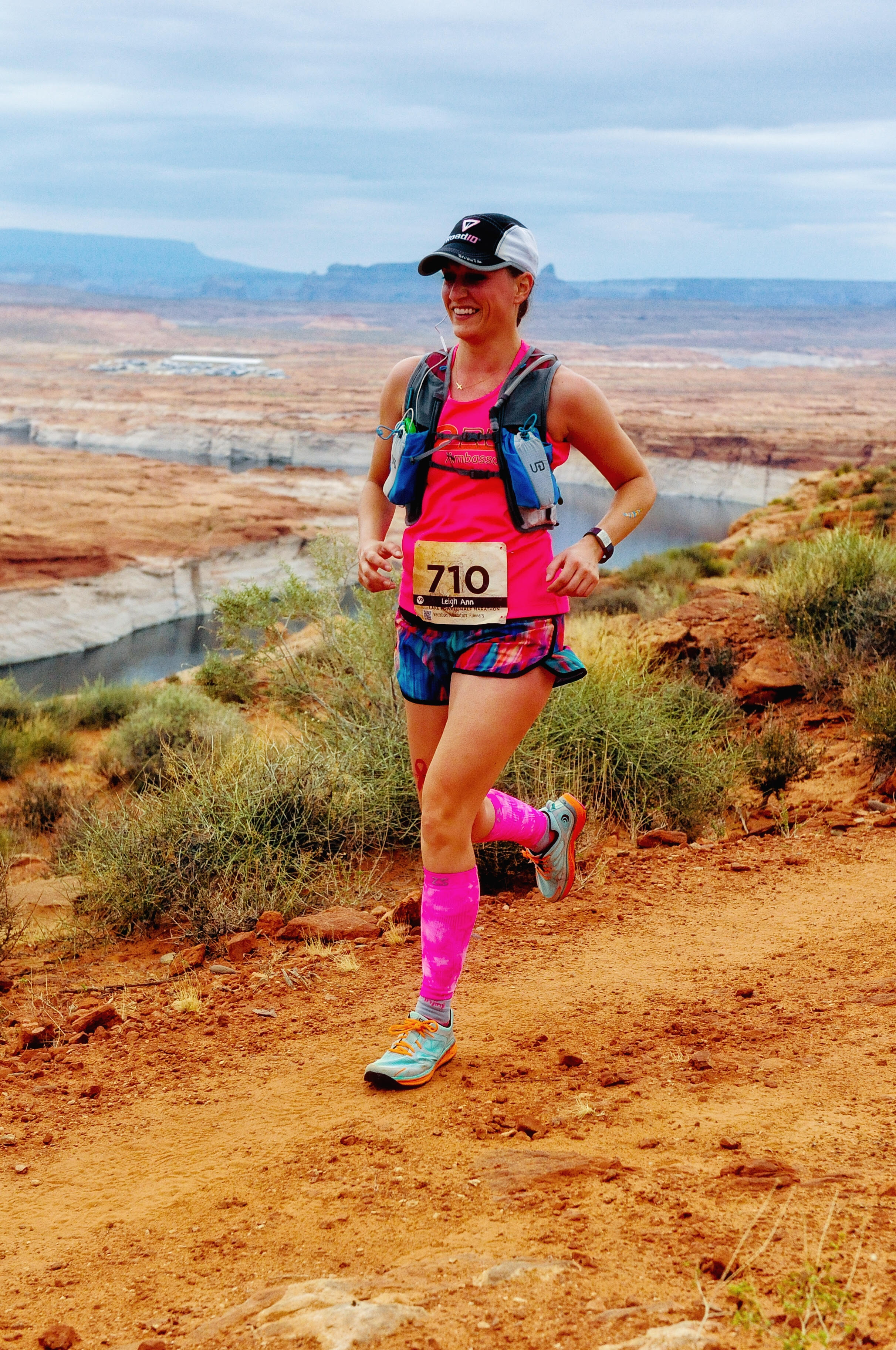
An Outlet from Academics
Skurupey admits there wasn’t much to her life outside of graduate school. In order to keep herself grounded, she took up running in the mornings and evenings. Running became rejuvenating.
“Gainesville has an amazing running community,” she said. “They are my family away from home. I don’t know what I would do without my running coach. Be in a community. Don’t try to do everything by yourself. Life is not meant to be walked through alone.”
Skurupey met her running coach of three years, Patrick Gallagher (MEd 14), at a patriotic themed “fun run” at the Oaks Mall. Gallagher remembers her showing up decked out in red, white and blue with blue star alien antlers and flags painted on her cheeks.
“It’s an example of the kind of enthusiasm Leigh Ann brings to everything that she does,” said Gallagher. “I can’t imagine her doing anything half way. If there’s ever a theme to a run, she shows up head-to-toe in costume. Nothing stops her from coming to workouts. She runs in the rain if it pours, and does the full make-up exercise when she has a class conflict.”
Skurupey told Gallagher running a marathon had always been a goal of hers to accomplish. There was just one catch: she has a heart condition called Wolff-Parkinson-White syndrome that induces rapid heartbeats due to increased adrenaline. At a young age, doctors had advised Skurupey against high-intensity running. Gallagher knew they were meant to work together. He had the same heart condition.
In 2015, Skurupey had surgery to partially fix her heart syndrome. She was worried she wouldn’t be able to run afterward, but Gallagher had the same surgery years ago and assured her slow and steady progression would get her back into the sport. In Oct 2016, Skurupey completed the longest race she’s ever run – 50K or about 31 miles, just over a full marathon distance, in the Gate to Gate trail race outside of Alachua.
Her bucket list includes participating in all the national park half-marathons. So far, Skurupey has completed the Lake Powell, Grand Canyon, Yosemite and Everglades trails with friends from Gallagher’s running group.
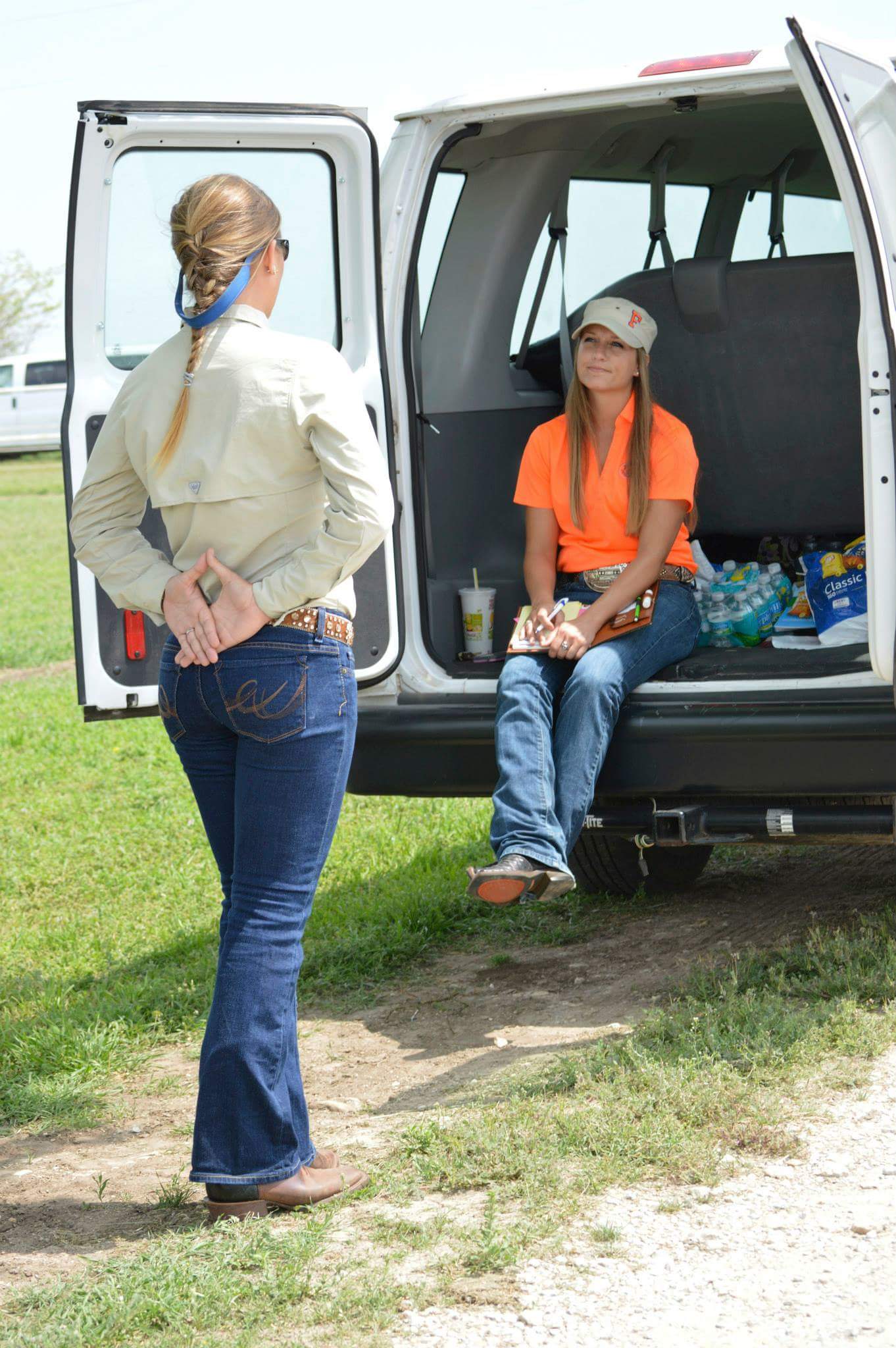
Reflections from an Academic
When looking back on her college career, Skurupey said she’s thankful for the hands-on aspect of her CALS education. She advises undergraduates to gain experience through research opportunities in their field.
“As graduate students, we are always looking for extra hands!” Skurupey said. “Professors are very open to help, and they want students to succeed and develop interests in their fields of study. They are very encouraging. Don’t be afraid to talk with professors.”
She said learning from peers and colleagues in other fields and specializations has contributed tremendously to her education. Since there are so many connections between animals and their environments, Skurupey enjoyed working with others in the Soil and Water Sciences department. She mentioned this research connection can often be overlooked. Experiences working with other students’ projects helped expand her breadth of knowledge.
Skurupey’s dream is to stay in academia and continue to coach an equine horse judging team. At the moment, she is headed in the extension direction after graduation. She accepted an offer from North Dakota State University as an extension specialist of 4-H youth development and animal science.
“One of the hardest things about being in academia is teaching such wonderful students and seeing them leave,” TenBroeck said. “It’s hard. I know they have their lives to live and move on in their careers. So, it’s hard for me to see [Leigh Ann] graduate, but I’m excited for what her future has in store.”
CALS Students Help Rebuild the Past and Shape the Future at the BTU
By Raychel Rabon
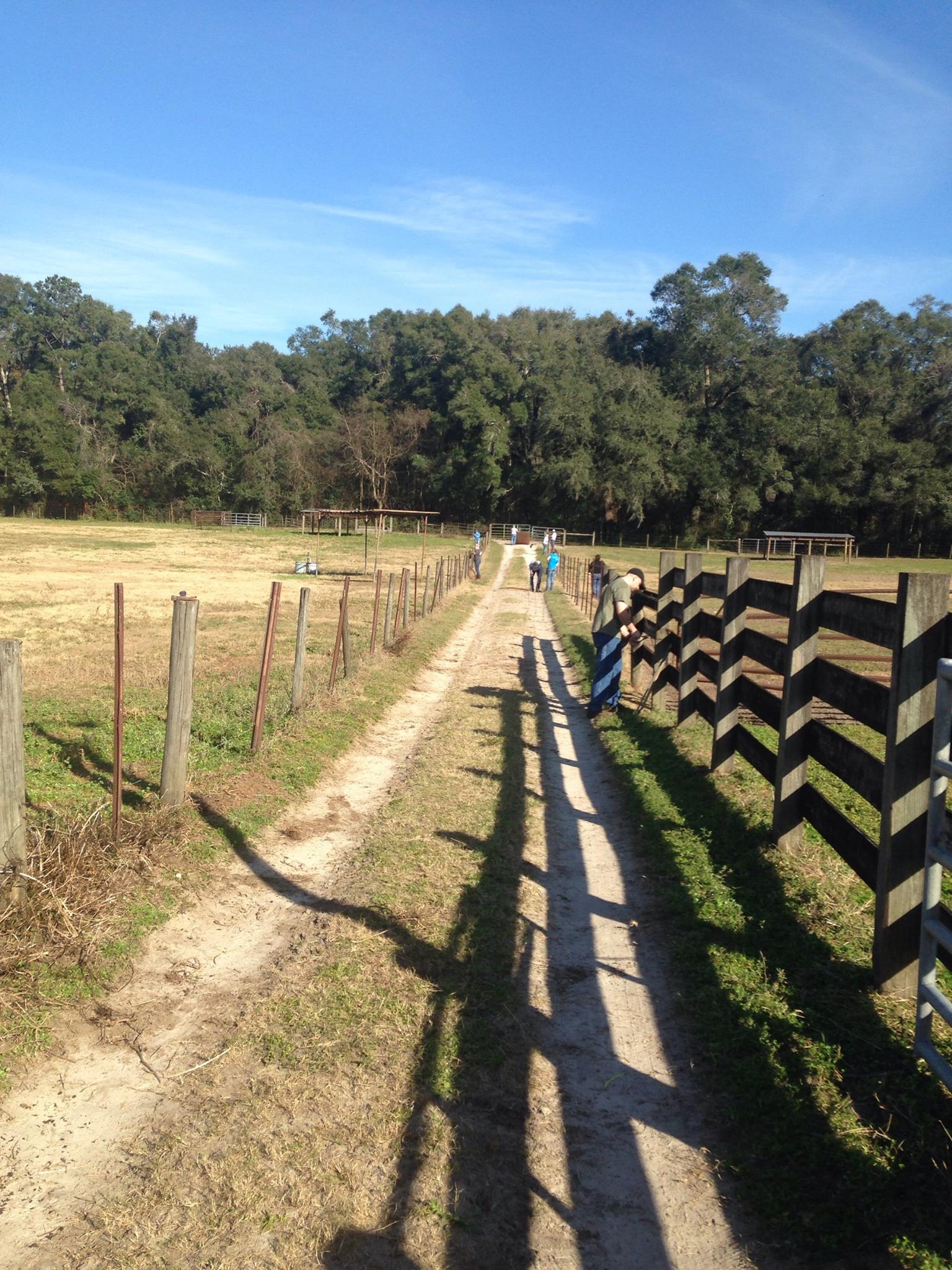
The UF/IFAS Beef Teaching Unit is undergoing major transformations and students in the Department of Animal Sciences are working hard to contribute to the plans for this facility. One of the recent acts of student participation in the Beef Teaching Unit expansion came from Todd Thrift's Beef Background and Feedlot Management class.
During the spring semester, Thrift, an associate professor in the Department of Animal Sciences, was meeting with animal sciences faculty and others working on the ground breaking process for the Beef Teaching Unit expansion to discuss what needed to be done to begin the work.
"Discussions were centered on movement of dirt and placement of the extra soil. It was decided that most likely fences needed to be removed so that heavy equipment could be used to move soil from the existing hilltop into the feedyard area. The question rose as to who would tear down the fences," Thrift said.
 It was decided that the work needed to be done as soon as possible and Thrift proposed that his class could get it done.
It was decided that the work needed to be done as soon as possible and Thrift proposed that his class could get it done.
"My beef feedlot class has lab on Monday afternoon. I sent an email at about 11 a.m. to my class and told them to come to lab in work clothes and bring your hammer and wire pliers," Thrift said. "In our previous dilapidated facility, we routinely taught a lab on fence fixing and facility repair."
Later that afternoon, Thrift's students showed up to lab ready and excited to work.
"I had no idea how this might proceed. I was hoping to get a small stretch of the fence down by the time lab ends at 5 p.m.," Thrift said. "In a span of two hours all of the fence was down, wire rolled up, posts pulled and boards stacked. Had this been subcontracted it would have taken a week and $5,000."
Thrift commented further on this, suggesting that this is not out of the ordinary and that this is the type of work full-time ranchers do every day. He hopes to convey this story to show that these are the type of valuable students that the Department of Animal Sciences and the College of Agricultural and Life Sciences are training and teaching who will eventually move on to serve in the local, national and global industry of agriculture.
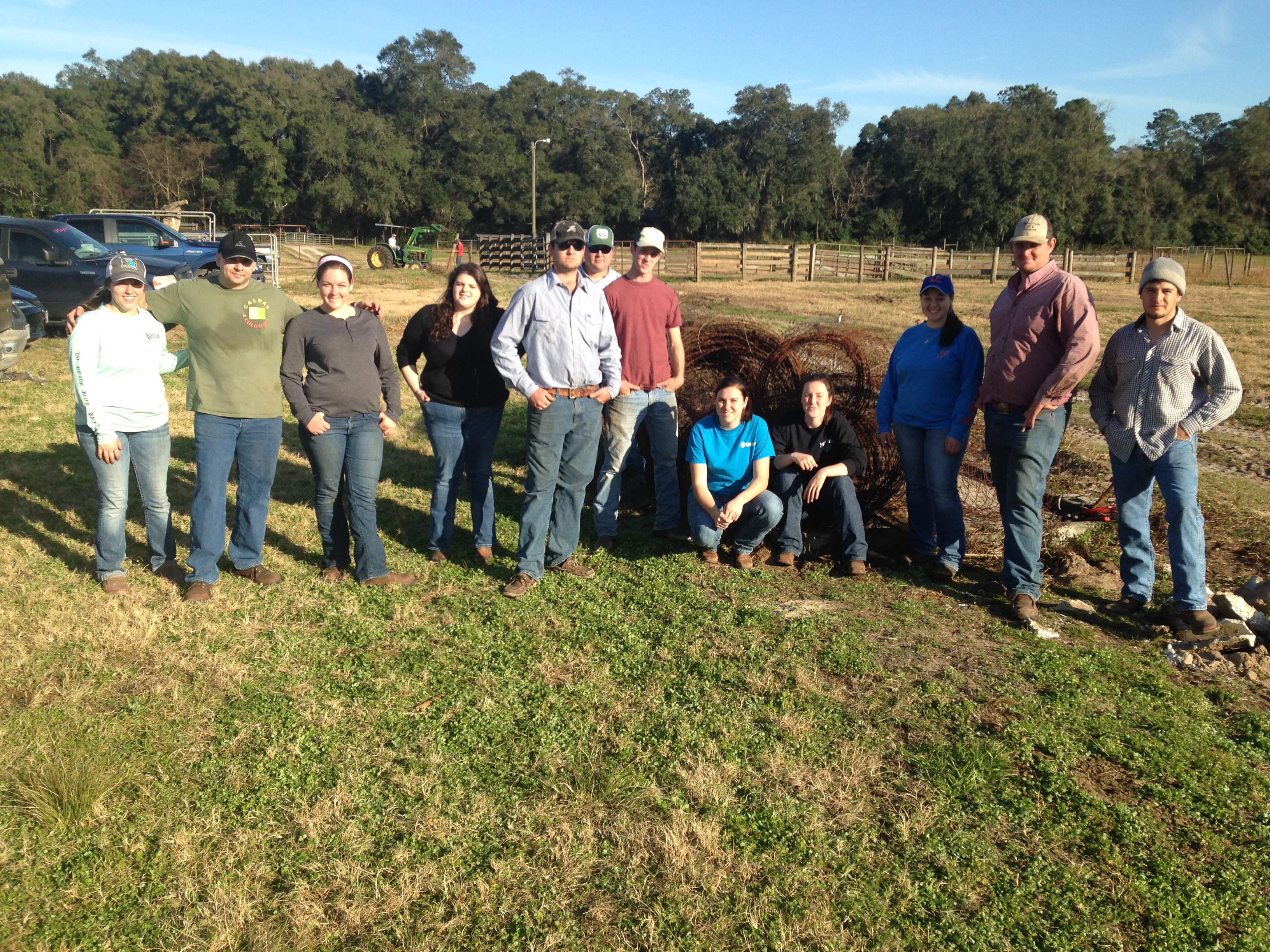 "I think you will see this group be involved on many, many levels," Thrift said. "The connections they make in these classes will be the lifetime business partners that they deal with for the next 40 years."
"I think you will see this group be involved on many, many levels," Thrift said. "The connections they make in these classes will be the lifetime business partners that they deal with for the next 40 years."
The Beef Teaching Unit is an instrumental aspect in teaching and training the students in this program as well as others in the agricultural industry. This facility is used for class laboratories, Extension programs, and training for Extension agents, ranchers, and volunteer leaders.
The Beef Teaching Unit was built many years ago originally as a research facility and later renovated to add a teaching unit. The facility was greatly affected by the Florida hurricane season 10 years ago. Student living areas, barns, pens, and much more were discovered to be damaged in the aftermath of these storms.
Recently, the Beef Teaching Unit has received an allotment of $2.6 million from the Legislature during the 2016 session that has been added to the $1 million previously allotted during the 2015 session. The total of $3.6 million will be used to complete the two phases of the Beef Teaching Unit expansion. Phase one is set to be completed by August or September with phase two estimated to be completed in 2017.
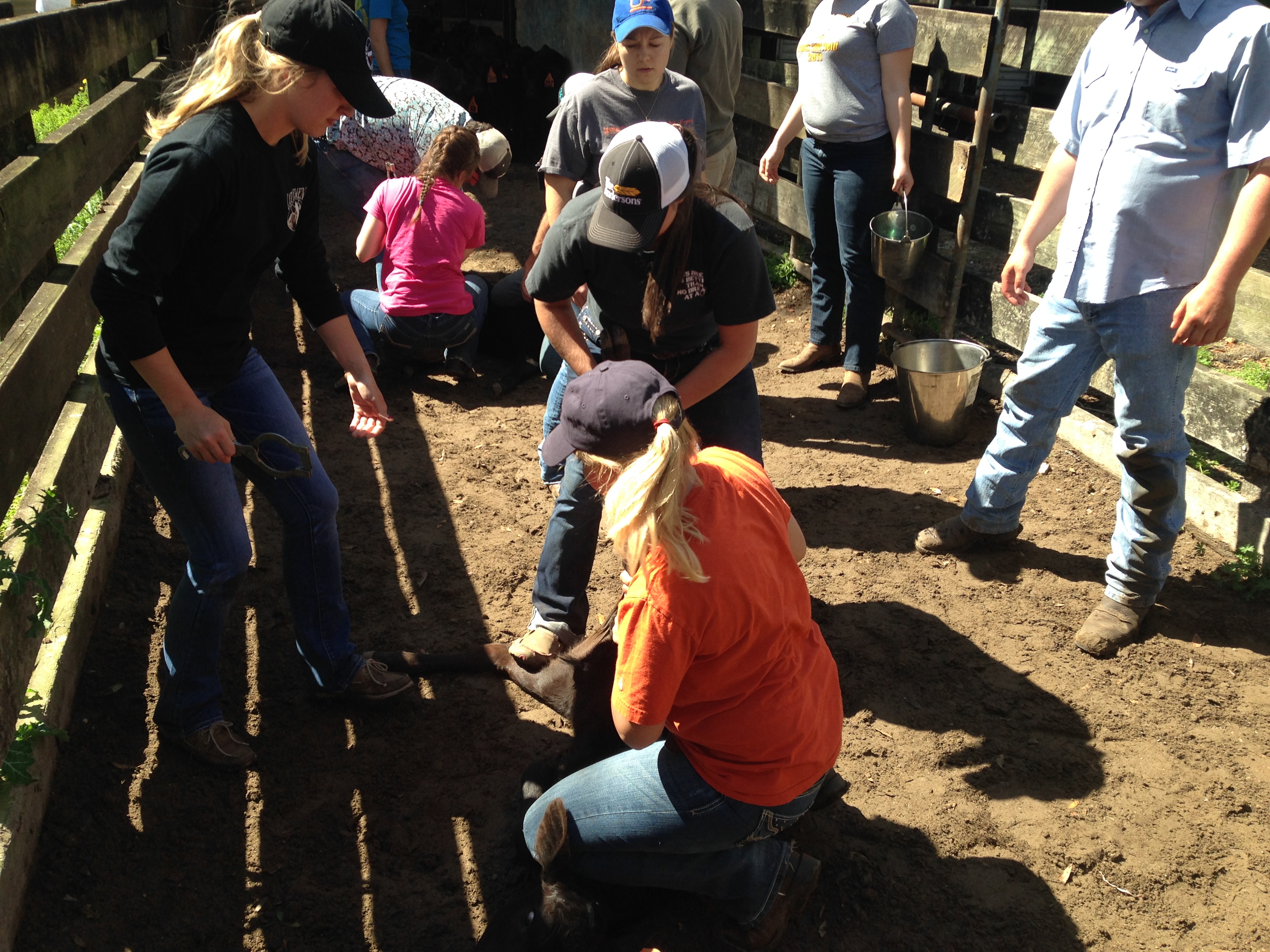 Thrift attributes much of the progress on the Beef Teaching Unit expansion to the Florida Cattlemen's Association and other industry supporters.
Thrift attributes much of the progress on the Beef Teaching Unit expansion to the Florida Cattlemen's Association and other industry supporters.
"They are intensely supportive of anything and everything that we do that is involved with training young people," Thrift said. "They are our biggest champions by far."
Introducing the Florida Youth Institute
By Raychel Rabon and Samantha Grenrock
The UF College of Agricultural and Life Sciences hosted the inaugural Florida Youth Institute (FYI) in July. FYI is a week-long pre-collegiate summer program sponsored by UF CALS, the Florida Department of Agriculture and Consumer Services, and the World Food Prize Foundation.
Rising juniors and seniors from across the state came to FYI in order to learn about issues in agriculture, life sciences, and natural resources and discover how they may fit into these fields in the future.
"FYI was created with an overall goal of engaging youth with issues in agricultural and natural resource sciences that affect Florida, the U.S. and world food security," said Elaine Turner, CALS Dean. "Ultimately, we hope to grow the talent pipeline by connecting students to academic programs in CALS that will prepare them for careers in agricultural and natural resource sciences."
Throughout the week, students had the opportunity to learn through hands-on experiences and interactions with researchers, instructors, and industry leaders at places such as the FDACS Division of Plant Industry, Florida Farm Bureau Federation, the UF/IFAS Center for Aquatic and Invasive Plants, the UF/IFAS Suwannee Valley Agricultural Extension Center, the UF/IFAS Student Teaching Gardens, and the Sensory Lab in the UF/IFAS Food Science and Human Nutrition Department.
"I thought FYI would be an amazing opportunity to explore more of Florida's agriculture rather than looking at it in a book," said Roddra Johnson, an attendee from Orange Park, Florida.
Nine FYI students were also recognized as Borlaug Scholars by the World Food Prize Foundation for their research on global issues as well as their presentation of scientific and policy recommendations for these issues.
"Out of thousands of high school students across the country, the 22 young leaders at the Florida Youth Institute stood out for their incredible enthusiasm and awareness of the issues," said Keegan Kautzky, director of national education programs for the World Food Prize Foundation.
Experiencing Medicine, Microbiology and Health in Europe
By Raychel Rabon
Students in the Department of Microbiology and Cell Science had the opportunity to experience their field of study in a unique way this summer through the Medicine, Microbiology and Health study abroad program in Europe.
Over the course of two and a half weeks, this program took students on a tour of many countries in Europe including the Netherlands, Germany, France and Switzerland while focusing on three subjects: medicine, microbiology, and health.
"I think every day [the students] encountered pieces of medicine, microbiology, and health besides the big pieces. … It is engrained in everyday life and emphasized in different visits we do," said Monika Oli, a senior lecturer and undergraduate coordinator in the Department of Microbiology and Cell Science.
While focusing on the subject of medicine, students learned about European health systems and health care as well as some aspects of naturopathy. The subject of microbiology included the history of microbiology and real-life application. Lastly, students studied health by comparing how life in Europe is different than life in the United States.
During this trip, students were able to learn more about their desired field of study and the opportunities that are available to them by interacting with professionals, touring leading organizations and companies, and experiencing real life applications.
"This trip really opened my mind to a lot of different things," said Neha Saini, microbiology and cell science senior. I always thought that medicine was limited to the hospital and visiting patients, but after going to these research institutions and pharmaceutical companies and having interactions with doctors who practice in Europe, I realized that there is more that I can do."
For more information about this study abroad, contact Emily Grubbe with UF International Center (UFIC) at egrubbe@ufic.ufl.edu or 352-294-3335 or visit the UFIC homepage for current applications.
Class to Career – An Experience in Pork Production
By Raychel Rabon
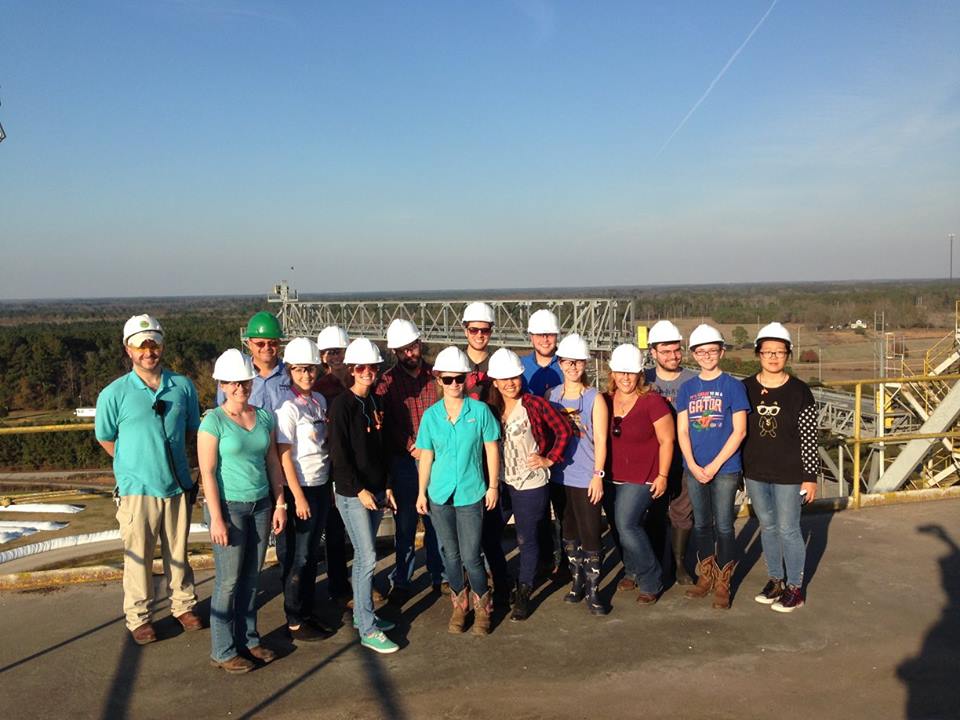
In the sectors of agriculture and life sciences, there are countless career opportunities that go undiscovered by students, but dynamic courses that provide students with classroom education as well as hands-on experiences are helping to change that. A class in the Department of Animal Sciences that focuses on pork production and swine management has been reintroduced for students to discover what this part of the food animal industry has to offer.
"Most of our students, when they think about jobs in animal sciences they think 'I can become a veterinarian.' That is by and large the majority, and that is fine. We need veterinarians, but there are a lot of career opportunities in the food animal industry beyond becoming a veterinarian," said Chad Carr, associate professor in the Department of Animal Sciences.
Carr revived the Pork Production course which offers hands-on learning experiences through lab activities and industry visits with a capstone trip to Tar Heel, North Carolina, to visit the world's largest pork producers Smithfield Foods. While on this trip, students were able to visit the grand facilities that Smithfield owns including the largest pork processing facility in the world and the second largest feed mill in the nation.
"There is nothing we can do on campus that would be the industry driven education that students get when they see the world's largest processor or the second largest feed mill in America. There is just no replication for that," Carr said.
This course incorporated other industry visits including Adena Meats' pork division in Chiefland, Florida, and Thompson Farm in Dixie, Georgia.
"There is only so much you can teach somebody about our industry at school. You can teach them all the science, but when you see a facility that is running 30,000 hogs like Smithfield, there is just no way for a student to get any concept of that at the local meat lab," Carr said.
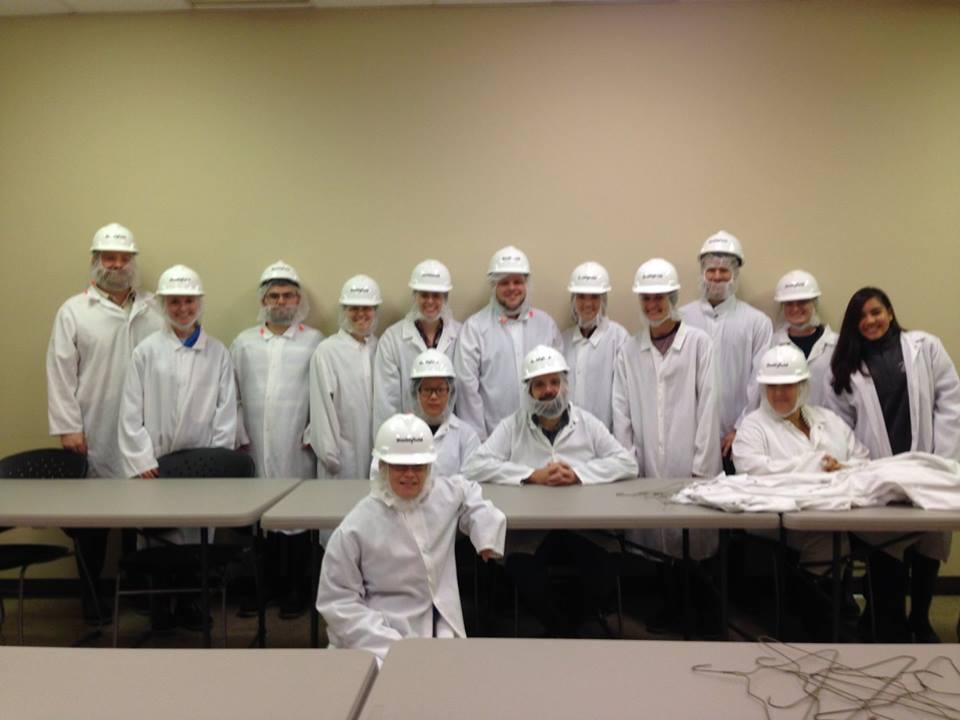 This course was reestablished in 2015 after a 40-year hiatus when the Department of Animal Sciences observed that students were beginning to show more interest in completing their required internship credits within pork production. Recognizing the interest and the opportunity to lead students to other opportunities, the department decided to offer the Pork Production course for senior level undergraduate students.
This course was reestablished in 2015 after a 40-year hiatus when the Department of Animal Sciences observed that students were beginning to show more interest in completing their required internship credits within pork production. Recognizing the interest and the opportunity to lead students to other opportunities, the department decided to offer the Pork Production course for senior level undergraduate students.
The curriculum for this course focuses on many aspects of pork production in the food animal industry. Students start the course by learning about the industry itself and continue to learn other aspects of pork production and swine management systems including production flow systems, genetics, nutrition, reproduction, carcass merit, health, environmental constraints, pricing structures, and economics. Students in this course receive hand-on experiences including farrowing a sow, processing a pig, and cutting meat.
Carr believes that the combination of classroom education and hand-on activities helped students in this course grow in their knowledge of this large industry.
"I think a lot of students in that class had their eyes opened to a lot of opportunities that they did not realize." Carr said.
CALS Student Pursues a Passion in Environmental Science
By Tahlia Pollitt
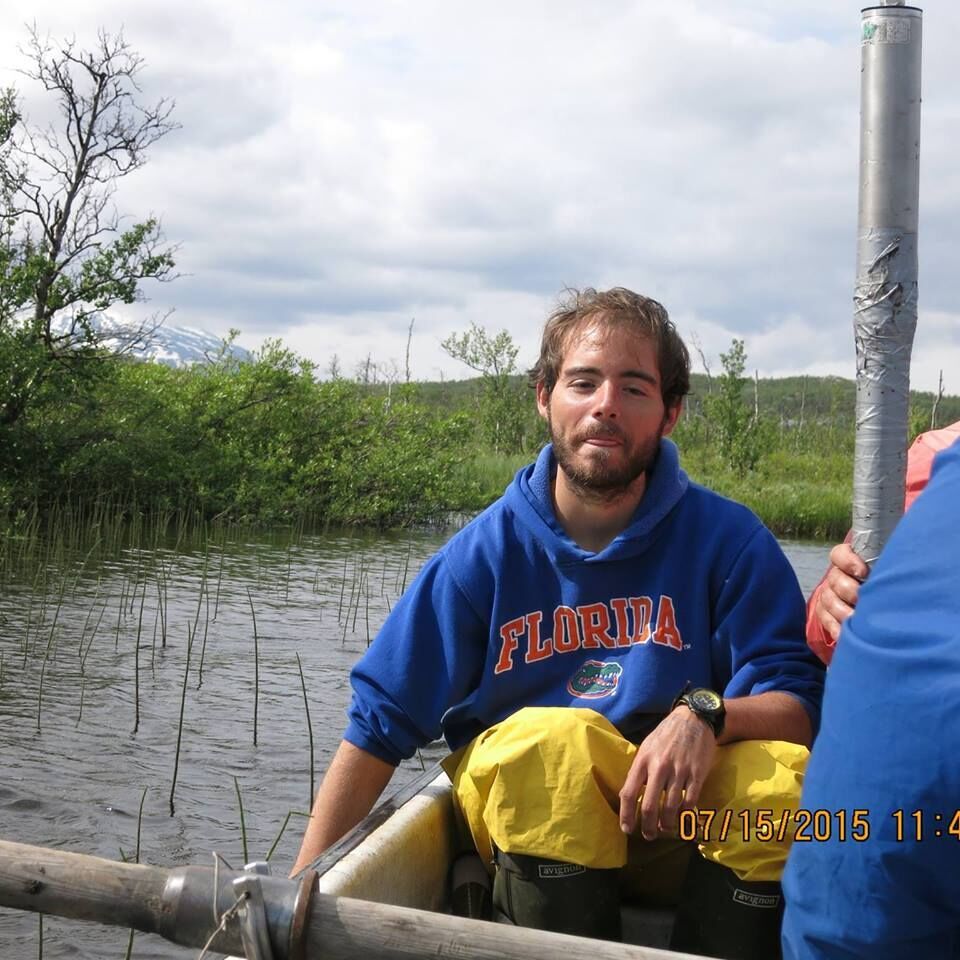
"I didn't think I could do it," he said.
Environmental science senior Christopher Horruitiner almost missed an opportunity to pursue his dreams. The Miami native started at UF as a freshman majoring in French and English. While he had always been passionate about science, Horruitiner was reluctant to choose a major in science because he didn't think he could handle the coursework.
Now, only a year and a half after deciding to make the transfer to environmental science, he is returning from a summer of researching methane emissions from wetlands in Sweden. The research opportunity was offered through Research Experiences for Undergraduates, a National Science Foundation program, based out of the University of New Hampshire.
This particular region in Sweden has been a focal point for research in recent years because it is located in a zone of discontinuous permafrost.
"The greater goal here is, ultimately, to improve our predictive capabilities in terms of climate," Horruitiner said.
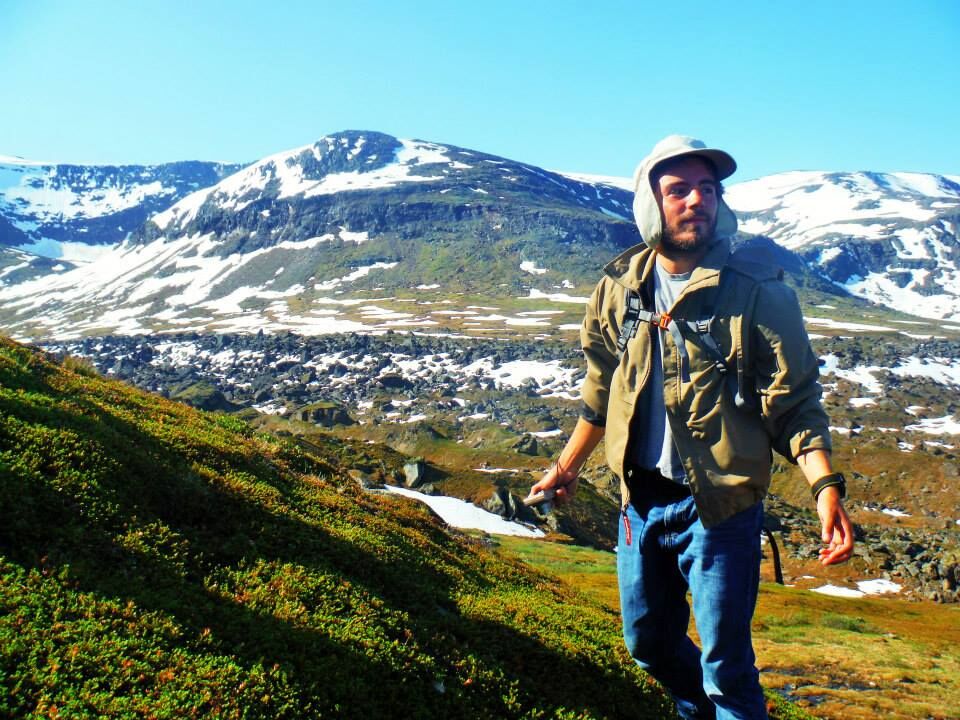 Horruitiner's work focused on identifying the types of vegetation, composition of sediments and levels of methane emissions throughout a series of lakes in the region.
Horruitiner's work focused on identifying the types of vegetation, composition of sediments and levels of methane emissions throughout a series of lakes in the region.
"We wanted to understand what the sediments were like, so we could take what we knew about the sediments and the plants and ultimately the methane concentrations, so we could make correlations," he said.
Horruitiner said a typical day in Sweden included 16 hours of work. Much of his time was spent in a rowboat surveying and recording vegetation and sampling soil throughout the lakes.
"The days were very long. The sun in that latitude doesn't set in the summer, so it's 24 hours of sunlight. It (the sun) will dip behind the mountains for maybe 3 hours and be kind of dark," Horruitiner said.
Horruitiner first participated in an REU last year studying phytoplankton in the Gulf of Mexico. Karen Bray, his adviser for environmental science, originally recommended the program to him. He credits the environmental science program in the School of Natural Resources and Environment for exposing him to a variety of fields.
"Being here at UF really prepared me through and through. In particular, the environmental science major is very interdisciplinary, and I think that was really crucial," he said. "It forces you to explore different fields, and being introduced to everything was really important for me in finding out what I really wanted to do."
After transferring to environmental science after two years, he had already earned enough credits to accept a minor in French, and he decided to pursue a minor in soil and water science as well.
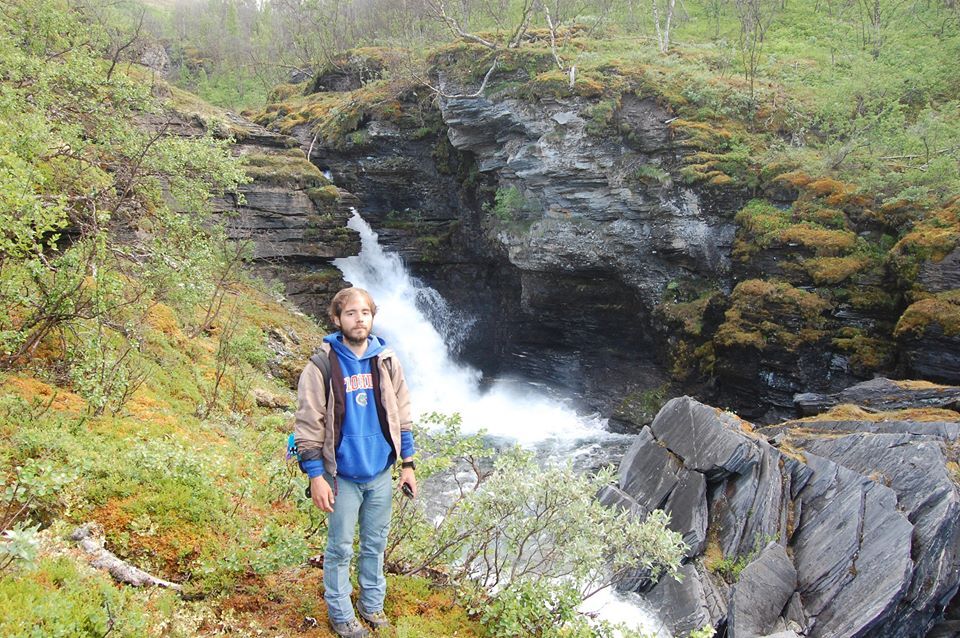 "I just pursued a passion and decided to challenge myself," Horruitiner said.
"I just pursued a passion and decided to challenge myself," Horruitiner said.
Horruitiner finally decided to change his major after taking a biological anthropology class as an elective. He now plans to attend graduate school and continue working in applied research science.
His involvement in the REU has provided him with professional connections, fueled his passion for research and opened his eyes to pursuing research abroad.
In December, Horruitiner will travel to San Francisco to present his research at the American Geophysical Union Fall Meeting, the world's largest Earth and space science meeting.
"The NSF sponsored REU programs offer exceptional opportunities for undergraduate students, and we encourage our students in the School of Natural Resources and Environment to take advantage of those opportunities," said Thomas Frazer, Ph.D, director of the School of Natural Resources and Environment.
For more information on REUs, visit https://www.nsf.gov/crssprgm/reu/.
Creating a Healthier Campus— CALS Students Take the Lead
By Tahlia Pollitt
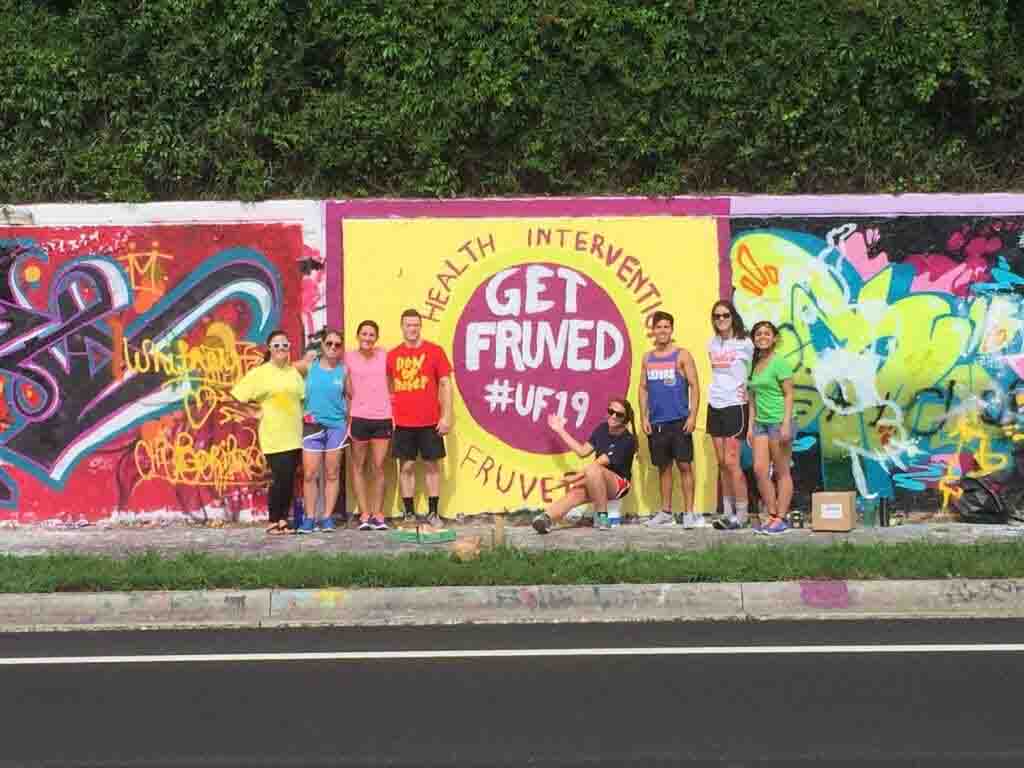
CALS students and faculty are teaming up with seven other universities throughout the nation in an effort to create healthier campuses.
GetFRUVED (Get your FRUits and VEgetables) is a USDA grant-funded project that seeks to measure how different campus environments affect the health of college students. Four universities are serving as the control group, and four are implementing health-promoting activities as the experimental group. UF is part of the experimental group.
Students involved in the project have taken classes in social marketing and environmental interventions and/or peer mentoring. These students then set out to recruit freshmen to be part of the study.
"I'm really excited to be able to talk to these freshman and see where they're at, meet them where they are and see how I can help," food science senior David Barreto said.
The goal is to follow 275 students at each university during the course of a year. The study is limited to freshmen that are overweight or are at risk for weight gain. Data are collected from participants at the beginning and end of the study.
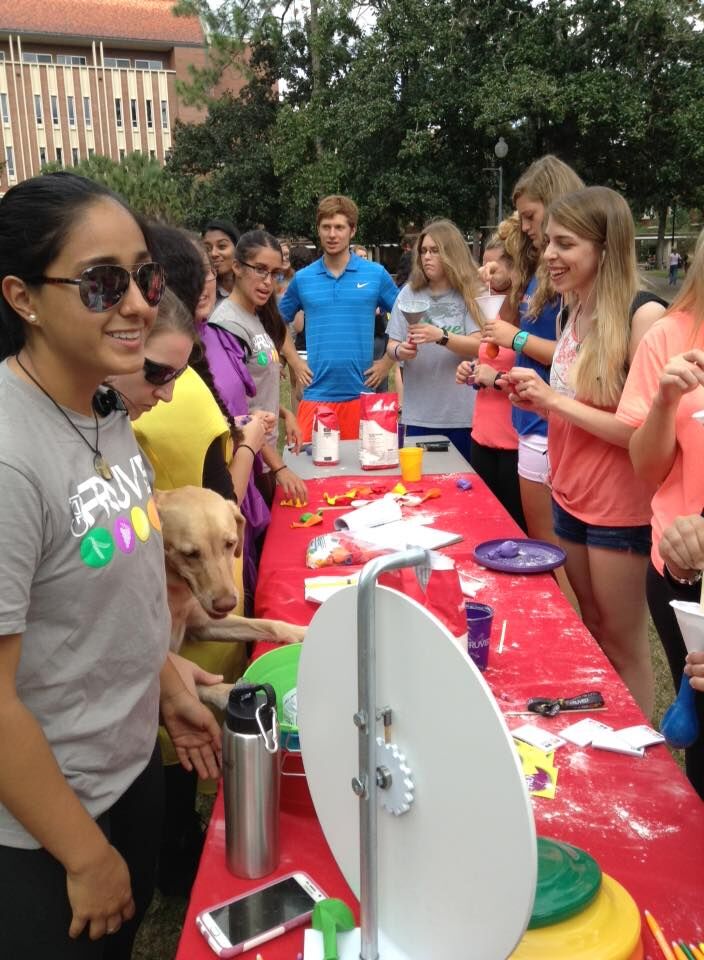 As one of the experimental campuses, UF students have created and are implementing a 24-week plan of health-promoting activities to take place throughout the fall and spring semesters. Study participants are the targets for these events, but all UF students are welcome to attend.
As one of the experimental campuses, UF students have created and are implementing a 24-week plan of health-promoting activities to take place throughout the fall and spring semesters. Study participants are the targets for these events, but all UF students are welcome to attend.
"We want to work on getting more people to the events because that's what we're here for, but just the fact that we've reached so many freshmen so far is really indicative of the fact that people want a change on campus," Barreto said.
Food science and human nutrition assistant professor Anne Mathews, Ph.D., RDN is leading the GetFRUVED effort at UF. Students have planned a variety of activities, including the "FRUVED-mazing race," salsa-making demonstrations and yoga events, Mathews said.
The focus of the events goes beyond healthy diets. They are aimed at promoting health in all facets, from stress management to physical activity, Mathews said.
"It (the FRUVED-mazing race) was fun," Mathews said. "The students were sprinting. They really wanted to win. The activities at each station across campus were fun and goofy, but also somewhat educational."
This project is unique because it is geared toward fostering a healthier environment for all students on campus rather than creating personal health plans for individuals, Mathews said.
Students involved in the project are assessing all aspects of the campus. The "walkability" and "bike-ability" were measured based on an assessment of walking paths and bike paths. Students also investigated the vending machines on campus and restaurants and convenient stores around campus, food science and human nutrition junior Brooke Denton said.
Students and faculty are aiming to implement this program in high schools next year, Mathews said.
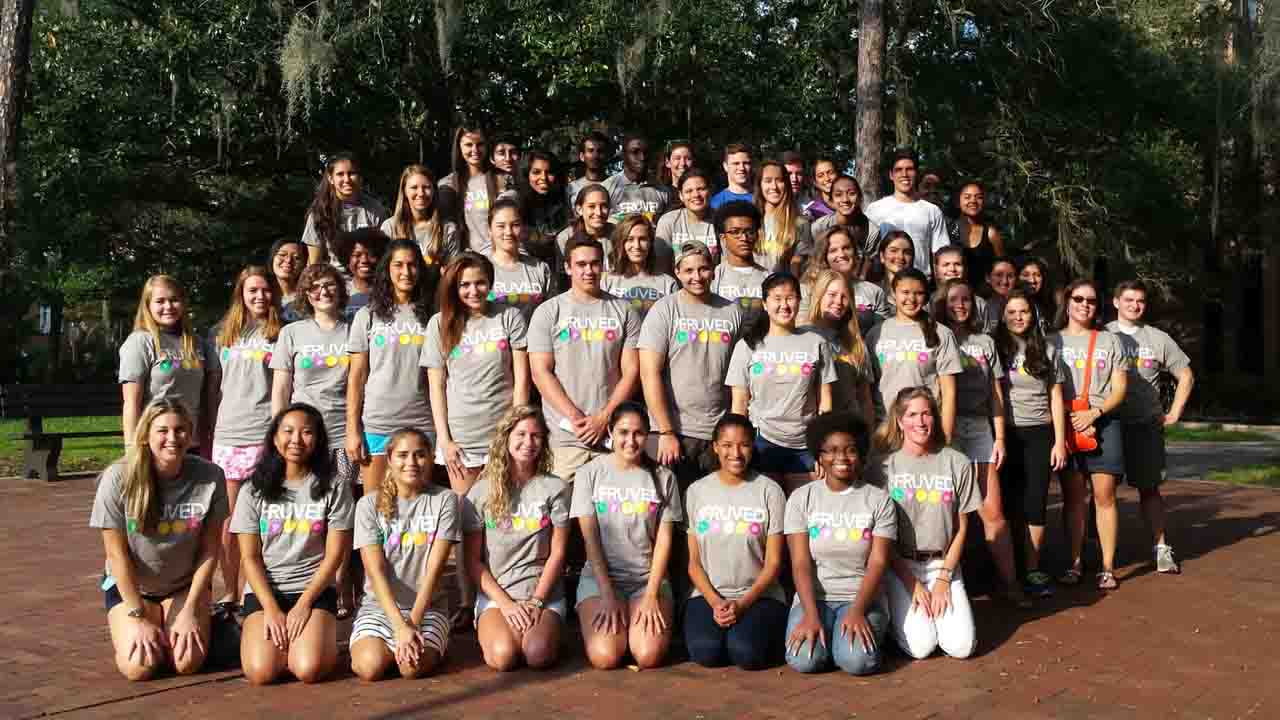 "What we're hoping is that some of the freshmen that are really engaged will want to then go work with high schools, so it will sort of trickle down- the mentee becomes the mentor to the high school students," Mathews said.
"What we're hoping is that some of the freshmen that are really engaged will want to then go work with high schools, so it will sort of trickle down- the mentee becomes the mentor to the high school students," Mathews said.
GetFRUVED has grown rapidly at UF. More than 1300 freshman took the survey to join the study, and over 700 qualified based on demographics and dietary habits. The surplus of students at UF may go to help boost the numbers of other universities that are not seeing the same success in recruitment, Mathews said.
"I think it's cool, regardless of what the end result of the project is. It's really cool to be part of something that's bigger than yourself," Denton said. "This project goes way beyond me wanting to put this on my resume. It's something that we're totally invested in."
To learn more about GetFRUVED, visit http://fruved.com/.
CALS Student Brings the Gator Good to Honduran Community
By Tahlia Pollitt
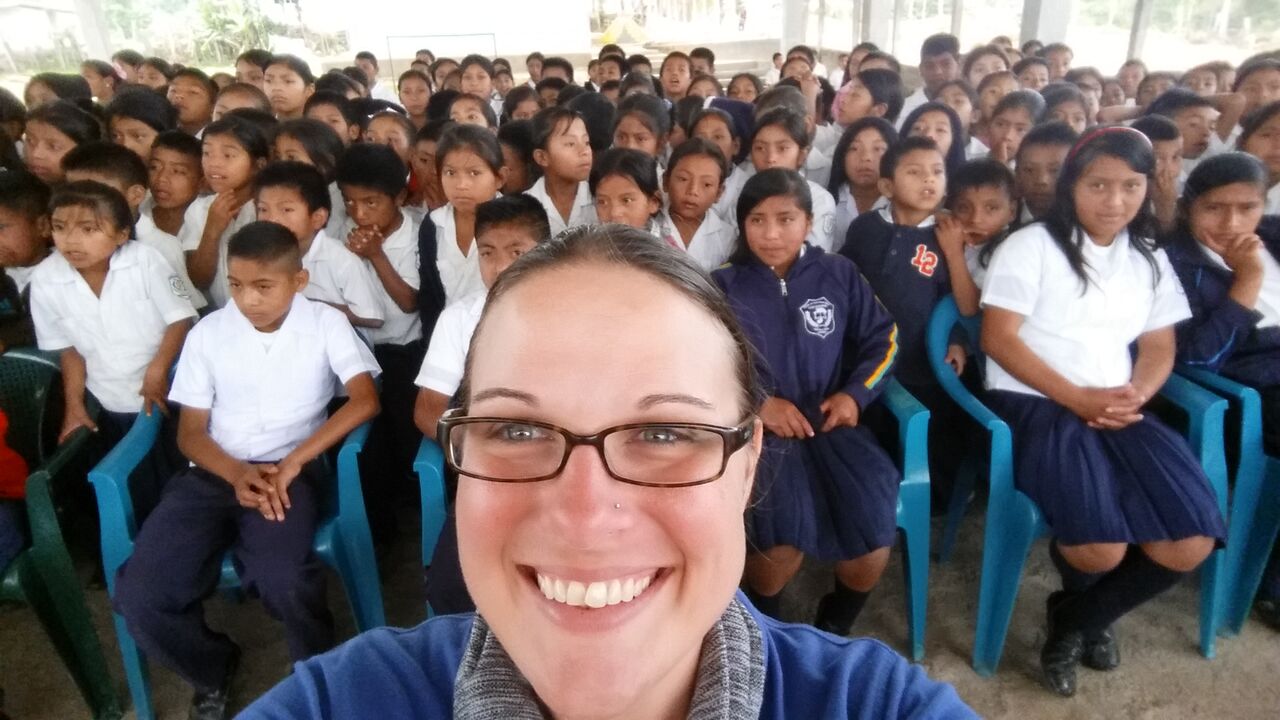
When she set out for Honduras on a research assignment at the beginning of the summer, interdisciplinary ecology graduate student Rebecca Williams did not realize the impact that she would have on the rural Honduran community of Candelaria.
Williams had previously spent two years in Honduras with the Peace Corps, and she returned this past summer to collect data for a USAID funded project through IFAS Global.
After working in the community for one week, Williams, who had been riding the bus to work with several schoolteachers, was asked to help in an unexpected way. The teachers wanted to build a library for their students but did not have adequate resources, so they went to Williams for help.
Unfamiliar with the community and the school, Williams was hesitant at first. The request weighed on her mind. Ultimately, she decided she had to do something for the community.
"It was really bothering me because I was there in Honduras to do my own research and further my own education, and here were these kids who had no books, so I decided I was going to go ahead and help," she said.
Williams immediately went to work raising funds. She compiled letters from the students with photos of the students and the school and presented them on an online fundraising site, GoFundMe.com. She took to email and social networking sites hoping to gain support from friends, family and UF faculty back in the U.S.
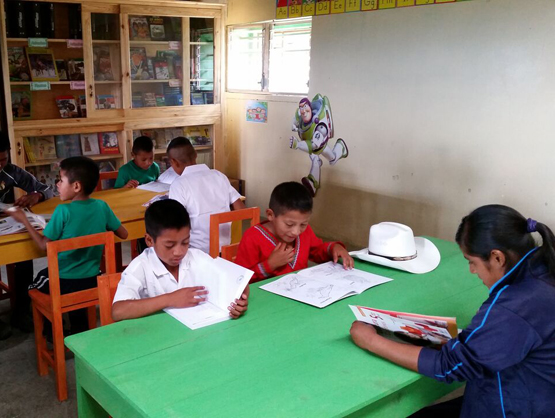 Within a couple of weeks, Williams was able to raise more than $8,000, which would eventually go toward approximately 1,000 books, a new wall to create a space for the library and new bookcases to protect the books from the warm and humid climate.
Within a couple of weeks, Williams was able to raise more than $8,000, which would eventually go toward approximately 1,000 books, a new wall to create a space for the library and new bookcases to protect the books from the warm and humid climate.
"The crazy thing is, the majority of the donations actually came from strangers. People in my social network were forwarding it to their family members, and I think because it was a library, people could get behind it."
Once they had the funds for the project, making the library become a reality happened very quickly. Williams went on two trips with the teachers to purchase books, ranging from Jane Eyre and Robin Hood to children's picture books.
"They had a big list of stuff they needed that they didn't have, including dictionaries and teaching materials," Williams sad. "Once we had that, we just picked all kinds of books."
By the time the library was completed, Williams had only spent a total of four weeks in Candelaria. On her final visit to the town, the students, parents and other members of the community surprised her with a ribbon-cutting and dedication ceremony for the new library, which was named in her honor, Williams said.
"I had so many parents come up to me one-on-one and thank me, telling me what a big difference this is going to make in their community," Williams said.
The impact of the library goes beyond the students. The community has a program that allows ninth grade students to pair with older members of the community and teach them to read. Prior to the library, students had to use their own textbooks to teach the adults. Now, they are able to learn with real books, Williams said.
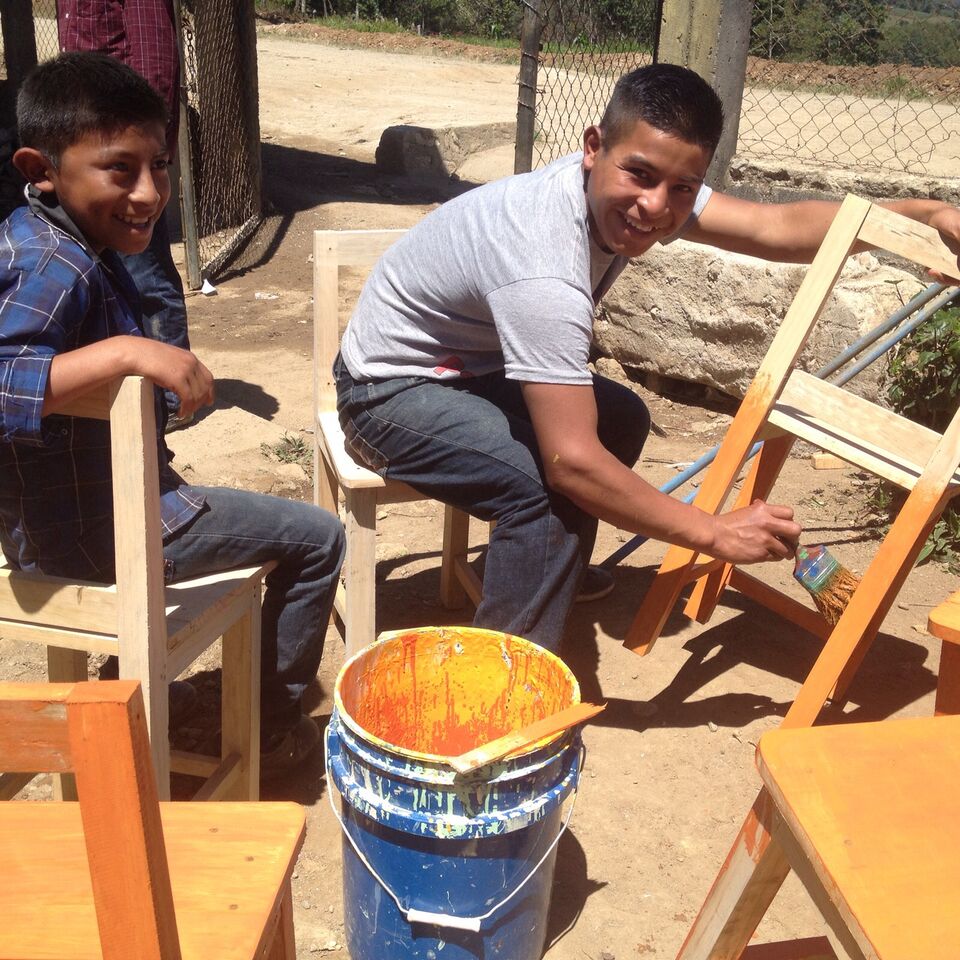 "There are no books in the community- no newspapers, no magazines - nothing, so the parents were really excited too to be able to come in and sit down with the books," she said.
"There are no books in the community- no newspapers, no magazines - nothing, so the parents were really excited too to be able to come in and sit down with the books," she said.
Candelaria is a unique community, Williams said. It is located in a very rural area, and the school is one of few that enroll students through ninth grade. Most schools in the area only have first through sixth grades.
"I'd like to see the school get through twelfth grade because it is clear right away that the people in my community (Candelaria) that have been through ninth grade, it's exactly what you hear about, lower rates of pregnancy, lower teen pregnancies and getting married later," Williams said.
Williams is back in Gainesville now continuing her Ph.D. program, but she keeps in regular contact with the teachers in Candelaria. She said there is still work to be done in the community, and she hopes to go back one day.
"I just really care a lot about this community," Williams said. "They really touched my heart, big time."
Williams is still working to acquire funding for the community to build three new classrooms for the expansion of tenth through twelfth grade.
Gators in India- A Transformative Experience
By Tahlia Pollitt
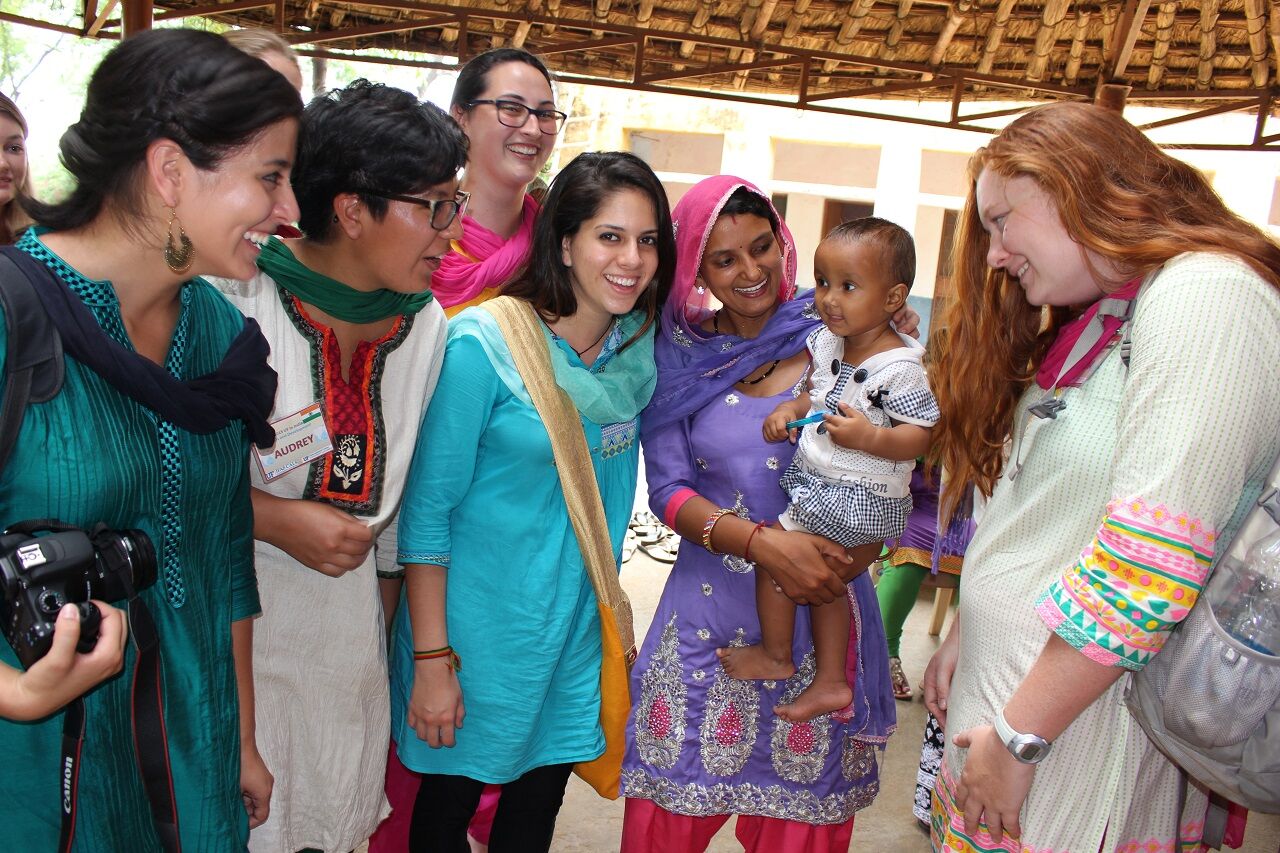
For one UF professor, being a teacher is about more than educating students; it's about transforming individuals.
Every other year, family, youth and community sciences professor Muthusami Kumaran, Ph.D. takes a group of students on the trip of a lifetime through his home country of India. The trip is part of a study abroad experience called "UF in India: NGOs and Development."
The program evolved from a course in nonprofit management that used to be offered on campus in Gainesville. Kumaran and his wife, Leela, who works with the UF College of Education, took the inaugural group of students to India in 2012.
"My students came to me and said, 'Dr. K, you talk so much about India, why don't you take us to India,'" Kumaran said.
After taking 16 students in 2012 and 2013, enrollment for the 2015 trip filled in just six days. By the time the 2015 group of 18 students returned in August, there were already students signed-up for the next UF in India trip scheduled for 2017, Kumaran said.
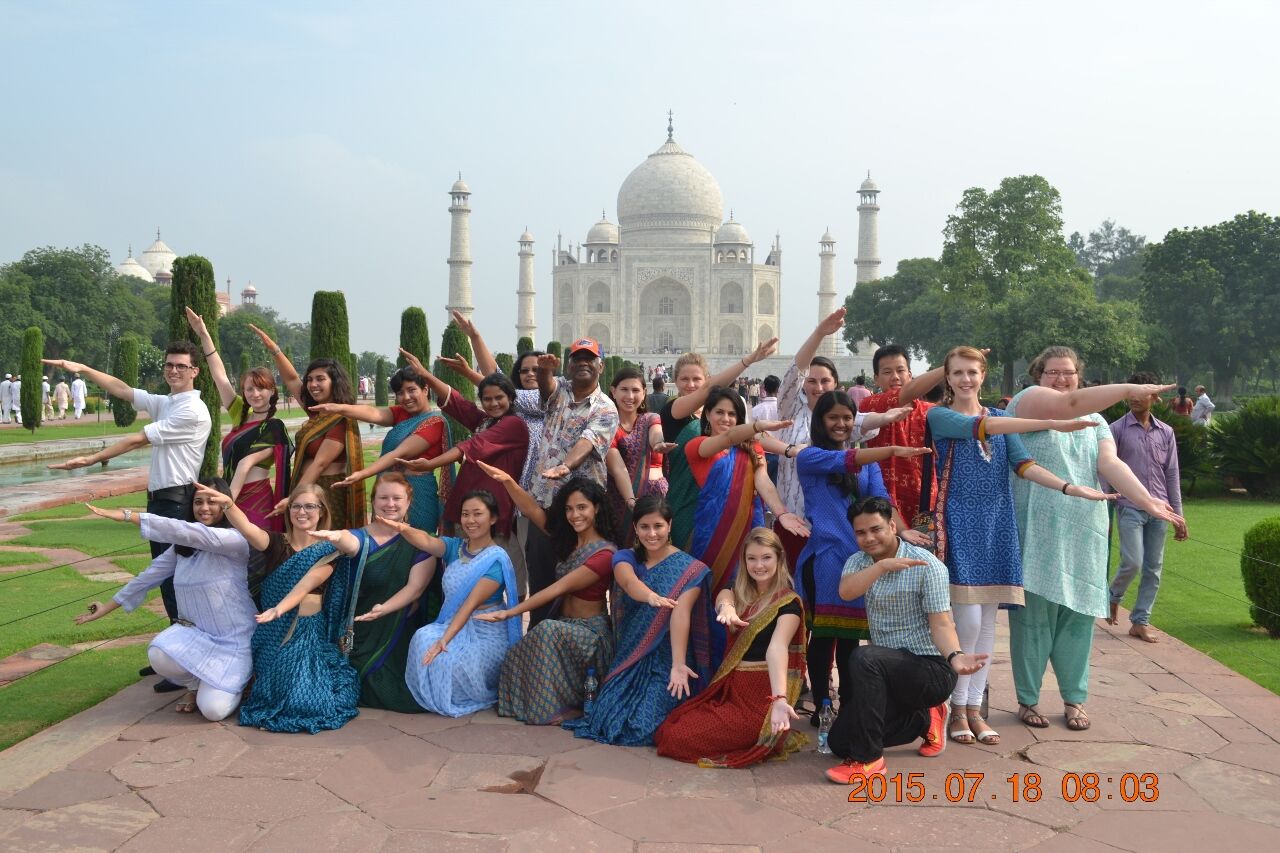 "I have students still writing me from the first group that went, saying, 'Dr. K, you changed my life,' and that is powerful. That's what keeps us going," Kumaran said.
"I have students still writing me from the first group that went, saying, 'Dr. K, you changed my life,' and that is powerful. That's what keeps us going," Kumaran said.
Over the course of five weeks, the students visit 18 nongovernmental organizations, the equivalent of nonprofit organizations in the U.S. Students have the opportunity to meet with the founders of the NGOs and get behind-the-scenes tours of the organizations.
Throughout the program, students are still participating in regular lectures. However, these lectures are often held in dining halls, on a bus or under a tree at various places throughout their travels, Kumaran said.
"You have to be willing to just completely be immersed in something else that you've never been immersed in before," said sophomore Jacquelyn Hoza.
Hoza, a nonprofit organizational leadership minor, participated in the most recent UF in India trip. Hoza hopes to return to India for an internship in the future. The trip was instrumental to her in making connections with NGOs for future opportunities, Hoza said.
"It's an intense program, but the bottom line is the transformative experience," Kumaran said. "They are changed for the better when they come back. They appreciate what they have here."
The students are offered insider knowledge of NGOs, but they aren't the only ones who benefit from the visit. While there, Kumaran works with NGO executives to teach them better management practices.
"This way, it's meaningful," Kumaran said. "They truly appreciate what we do, and they also welcome our students to see what they do in terms of impact and how they run the organization."
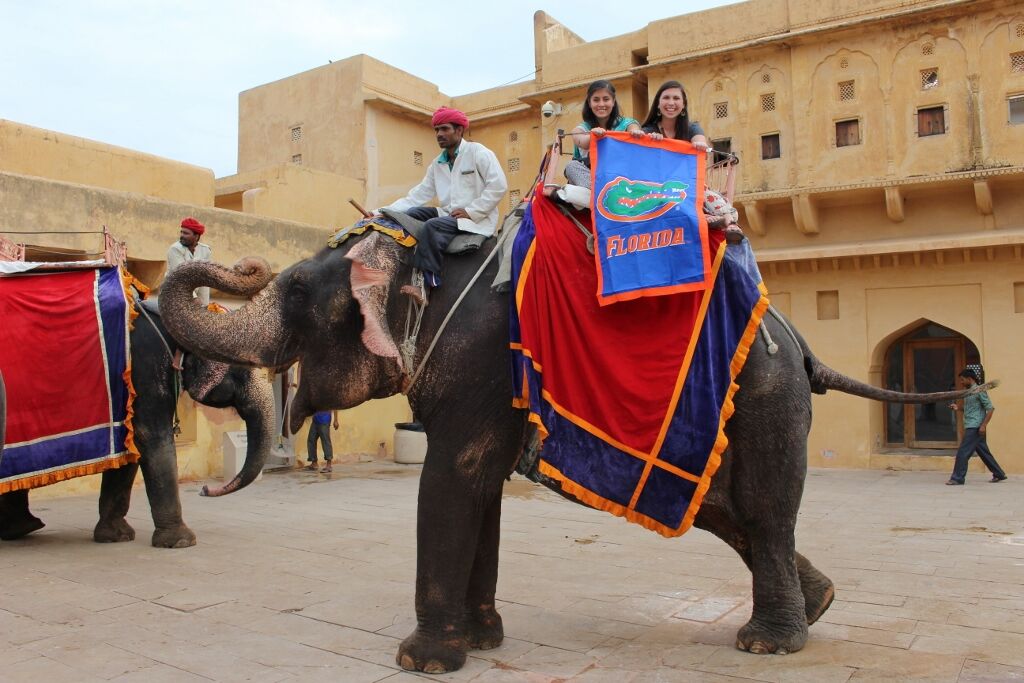 During their travels, the students visit the Taj Mahal, wear traditional Indian attire and eat traditional Indian meals, Hoza said.
During their travels, the students visit the Taj Mahal, wear traditional Indian attire and eat traditional Indian meals, Hoza said.
"Sometimes it's without the comforts of home, without the foods that you recognize, without talking to your family for a few weeks- I feel like that's where all the real change happens and you learn about things," Hoza said. "You learn about yourself."
While the students gain valuable knowledge from the NGO tours and the lectures, the real transformation occurs through intense cultural immersion, Kumaran said.
"Yes, we take them to Taj Mahal, but we also take them to slums and rural areas and show them how people live, and how NGOs affect their lives," Kumaran said.
The goal of the trip is to provide unique insight into NGO operations, but also to develop global citizens, Kumaran said.
"These students, every single one of them so far, I can guarantee you, they are transformed for the better," Kumaran said. "They have become global citizens. They understand how different cultures work. They understand how NGOs work."
Throughout the trip, Kumaran uses Twitter to post pictures and updates on the group's journey. CALS dean Elaine Turner was one of many who kept tabs on the group.
"I really enjoyed seeing photos of the group, sometimes in traditional Indian dress, sometimes in Gator gear, and following their progress around the country through Dr. Kumaran's posts on Twitter," Turner said. "Study abroad was an important part of my college experience and I'm pleased to see our students getting these opportunities."
Biology Major Prepares Students for Success
By Morgan Davis & Tahlia Pollitt • July 2015
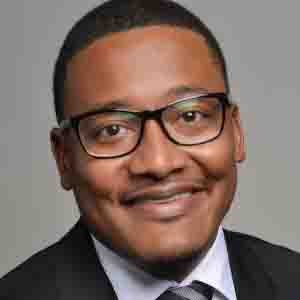
One of the college's most popular majors is also one of its newest. Graduates from the biology major are just beginning to flourish professionally.
The College of Agricultural and Life Sciences (CALS) developed the Biology major in conjunction with the College of Liberal Arts and Sciences (CLAS). The
unique collaboration between two colleges allows students to select from six different tracks and more than 100 courses to count toward their major in biology
In 2008, the first class of biology majors graduated from UF. Since then, the major has continued to grow and attract more students.
Ruan Cox Jr. was among the first students to graduate from the CALS biology major. Cox said his time at the University of Florida significantly impacted his
entire career path.
"CALS is the best college at the University of Florida," Cox said. "I don't think I would have made it to where I am today without it."
When Cox began his education at UF, his plan was to become a dentist. After speaking with CALS Dean Elaine Turner, Cox decided to change his plans, and take
his interest in science in a different direction.
Although a degree in biology would have still allowed for Cox's plans to attend dental school, he was able to choose one of four specializations offered
within the major in CALS to best suit his desired career path. Within the CALS biology major, students are able to select from pre-professional, applied
biology, biotechnology and natural science specializations.
Upon graduation, Cox was accepted into the Ph.D. program in the University of South Florida Department of Molecular Medicine.
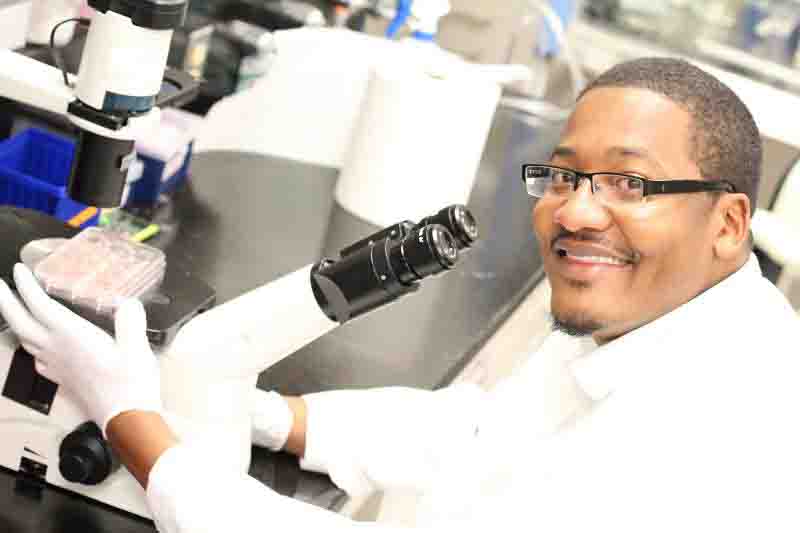 Following completion of his doctoral program at USF, Cox hopes to focus on policy and research for better funding in basic sciences.
Following completion of his doctoral program at USF, Cox hopes to focus on policy and research for better funding in basic sciences.
"Our biology students are well prepared for graduate school and a variety of careers," Turner said.
Although, at the time, the biology major was new to CALS, Turner and other faculty and staff members worked to create a supportive atmosphere for students
with unique and personal advising opportunities.
"When you go to school to earn a degree, it's easier when you have a support group behind you," Cox said.
Cox is not alone in his success as a CALS biology graduate. Graduates from the CALS biology major continue to see success in many fields including
agricultural science, wildlife and zoology, optometry, dentistry, genetics and botany.
For more information on biology and other CALS undergraduate majors, visit www.cals.ufl.edu/undergraduate
Adviser's "Tough Love" Results in Lifelong Collaboration
By Tahlia Pollitt • July 2015
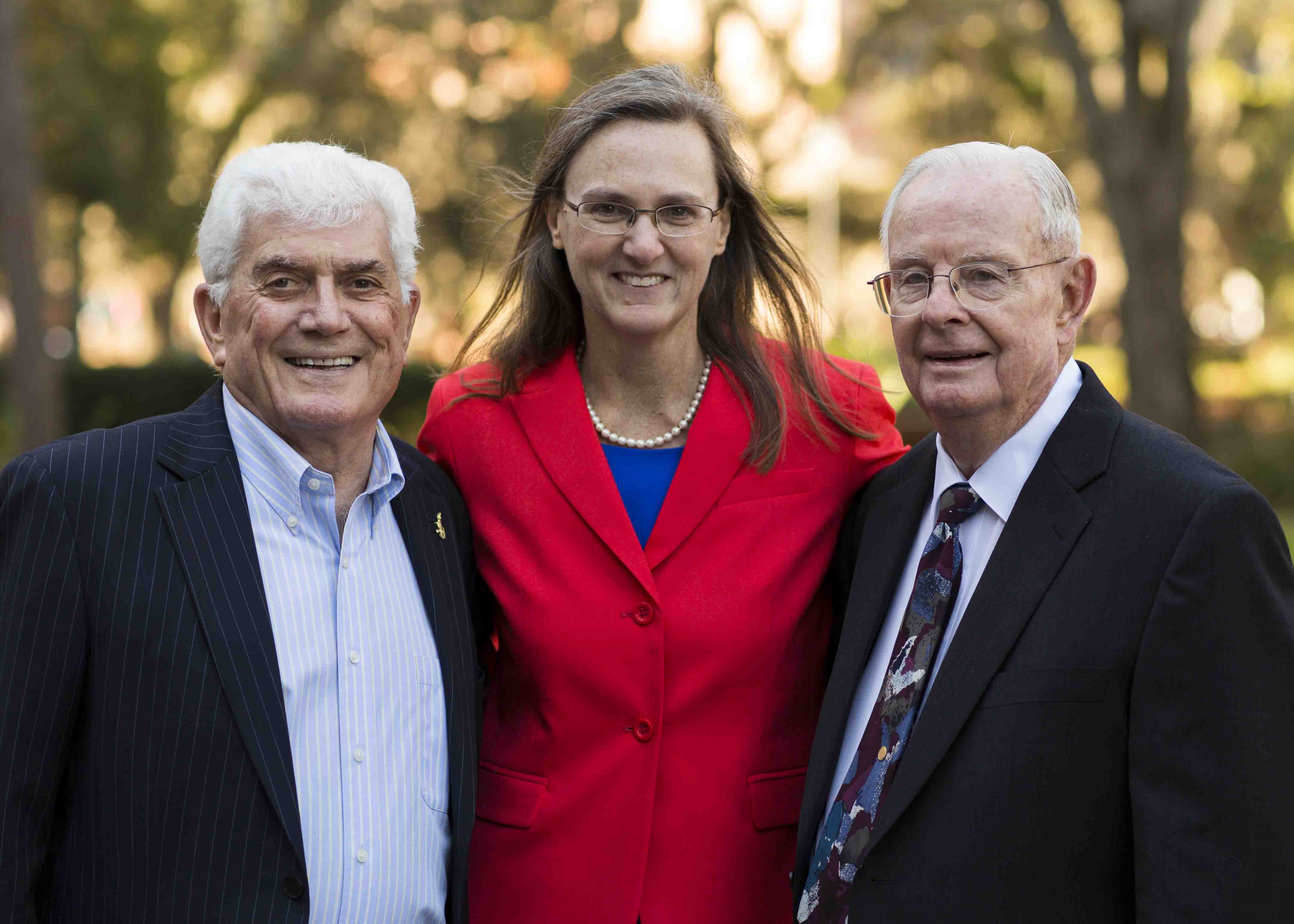
Fifty years after graduating from the University of Florida, Ghazi Taki returned to Gainesville to accept the Gator100 award for the success of his rapidly growing company, Amazing Taste.
The first Gator100 awards were held in February 2015 to recognize the fastest-growing businesses owned or led by UF graduates.
Taki graduated with a degree in meat science from the College of Agricultural and Life Sciences in 1965 and went on to develop a number of successful seasoning products. Taki said he would not be where he is today if not for his time at UF.
"Everything I know about meat tenderness and juiciness, and how you make food taste good and convenient – that's all Florida," Taki said.
After receiving a bachelor's degree in Baghdad, Iraq, then moving to Stillwater, Okla., to earn a master's degree in meat science from Oklahoma State University, Taki came to UF to continue his education. Taki's unique research efforts at OSU caught the attention of several graduate programs throughout the nation, but Taki was convinced that UF could offer him more than any other school.
"I heard that Dr. Palmer was one of the phenomenal meat science professors, and I thought that was an opportunity that I should explore," Taki said.
Zane Palmer, past professor in the animal sciences department, served as Taki's advisor throughout the course of his Ph.D. program.
"He (Palmer) was tough, very determined, and very demanding, but it was all good," Taki said. "Everything he had me do was a phenomenal thing for my career, and for my future."
As Palmer's only graduate student at the time, Taki got all of Palmer's attention. Palmer required that Taki take additional English language courses, retake organic chemistry courses, and even that he take several courses in the medical school to develop knowledge on specific technologies, Taki said.
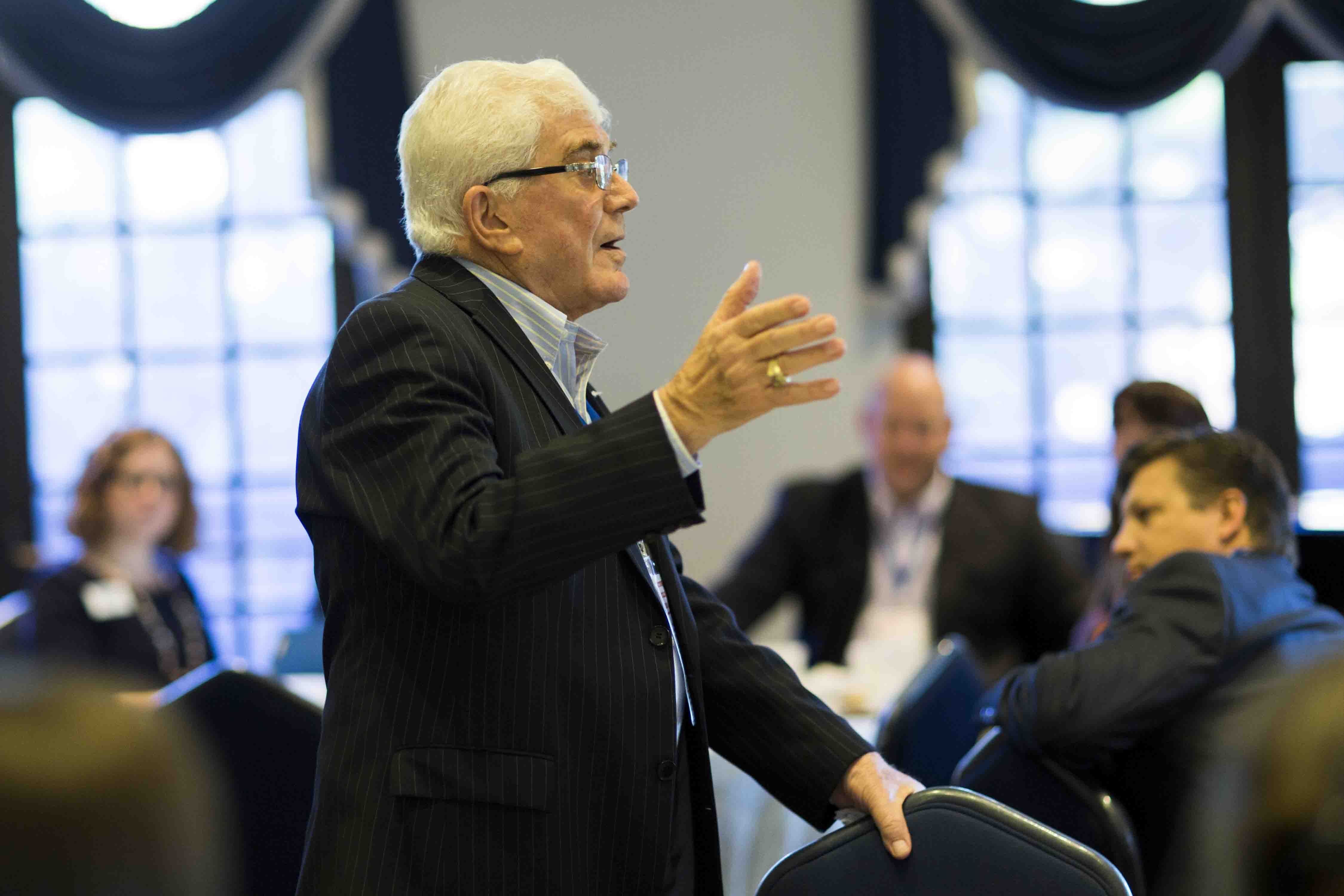 "He was very generous with his time with me, but had high expectations," Taki said.
"He was very generous with his time with me, but had high expectations," Taki said.
Palmer and the animal sciences faculty were working in collaboration with Publix Supermarkets during the time that Taki was a student at UF.
"We worked very closely with Publix, and all this was evolving beginning at a time when Ghazi was here as a student, so he became acquainted with Publix," Palmer said.
Several years after his graduation, Taki would meet Publix again when they became the first grocery store to sell his products, Taki said.
Taki's success came as no surprise to Palmer.
"He learned quickly. He was energetic, enthusiastic about his research and coursework, and he was a self-starter. He was ambitious. He set his objectives, and he persevered in the pursuit of these objectives," Palmer said. "All of these things, coupled with his pleasant, always cheerful personality, indicated that he should have a most successful career in the US- and of course, he did."
Over the last 50 years, Palmer and Taki have maintained contact, and kept up to date with each other's progress and research, Palmer said. Now 93 years old, Palmer was in attendance with Taki at the Gator100 award ceremony in February.
"I was very, very pleased," Palmer said. "I had followed his progress."
Entomology Research Takes UF Undergrad to Smithsonian Museum
By Tahlia Pollitt • July 2015
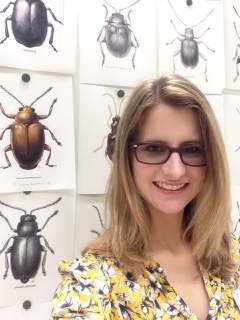
While most undergraduates were studying for final exams and making summer plans, one entomology student was busy finalizing arrangements to travel to the Smithsonian National Museum of Natural History.
Since last summer, Stefani Harrison, a senior, has been working on a research project with the goal of distinguishing between two species of Scarab beetles.
"These beetles are keystone pollinators," said Matthew Moore, doctoral student and lead researcher on this project. "They're involved in the pollination of many species of plants, so they are important for the functioning of the tropical forests."
The two species of beetles, cyclocephala mafafa and cyclocephala deceptor are virtually indistinguishable to the untrained eye. They are currently classified as two different species, but Harrison and Moore hope to conclude whether or not the two species are separate or if they are actually one species.
The team has spent several months studying more than 700 specimens of these beetles. They have conducted DNA tests and dissections and gathered detailed descriptions of each beetle for comparison, Harrison said.
After collecting data for almost a year, Harrison had the opportunity to travel to the Smithsonian museum in Washington, D.C., to study the type specimens for these two species of beetles. Type specimens are specimens that are selected to be representative of the species as a whole, Moore said.
"I went there to photograph them and get data off the type specimens to determine if cyclocephala deceptor is really a different species or not," Harrison said.
What Harrison and Moore didn't anticipate was the Smithsonian staff allowing Harrison to take the type specimens back to UF for further research. Having the ability to continue studying the specimens in the laboratory is a major advantage, Moore said.
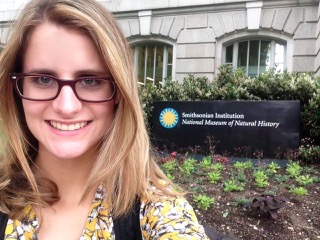 "I was uncertain that they would let them leave with an undergraduate student," Moore said.
"I was uncertain that they would let them leave with an undergraduate student," Moore said.
Moore explained that the Smithsonian houses a large collection of type specimens that are commonly used for research by many institutions. Although, it is much more common for graduate students and faculty members to be involved in these projects than undergraduate students, Moore said.
"I'm excited, but I just know you have to be really careful with specimens like that, and you need to take care of them," Harrison said.
Moore said he designed the project knowing that it would be a good opportunity for an undergraduate student to gain experience in research.
Harrison said she had expressed interest to her professors and advisors to be involved with research, so when the opportunity arose, she was immediately recommended.
"At the end of it, Stefani will have a paper, she'll have all this experience and all these professional connections," Moore said. "I designed this project with the specific intention to develop an undergraduate researcher. I knew we would have good results because I knew this was an interesting project."
Although she would like to focus future efforts on live animals, Harrison said her involvement in this project has influenced her educational and career goals.
"This project has definitely inspired me to push more towards beetles," Harrison said. "I've realized that Scarabs, and all beetles, are really awesome, but they're also not really acknowledged."
UF Students Work to Feed Their Campus Community
By Ashley McLeod • July 2015
